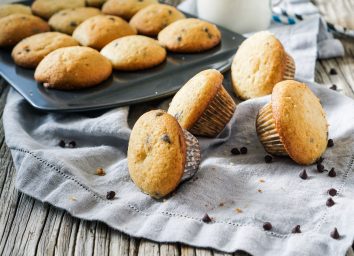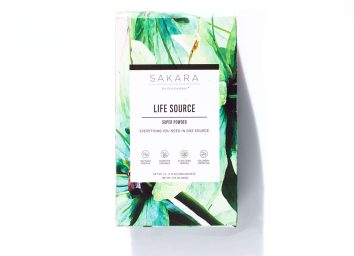40 Foods Doctors Want Women Over 40 to Eat
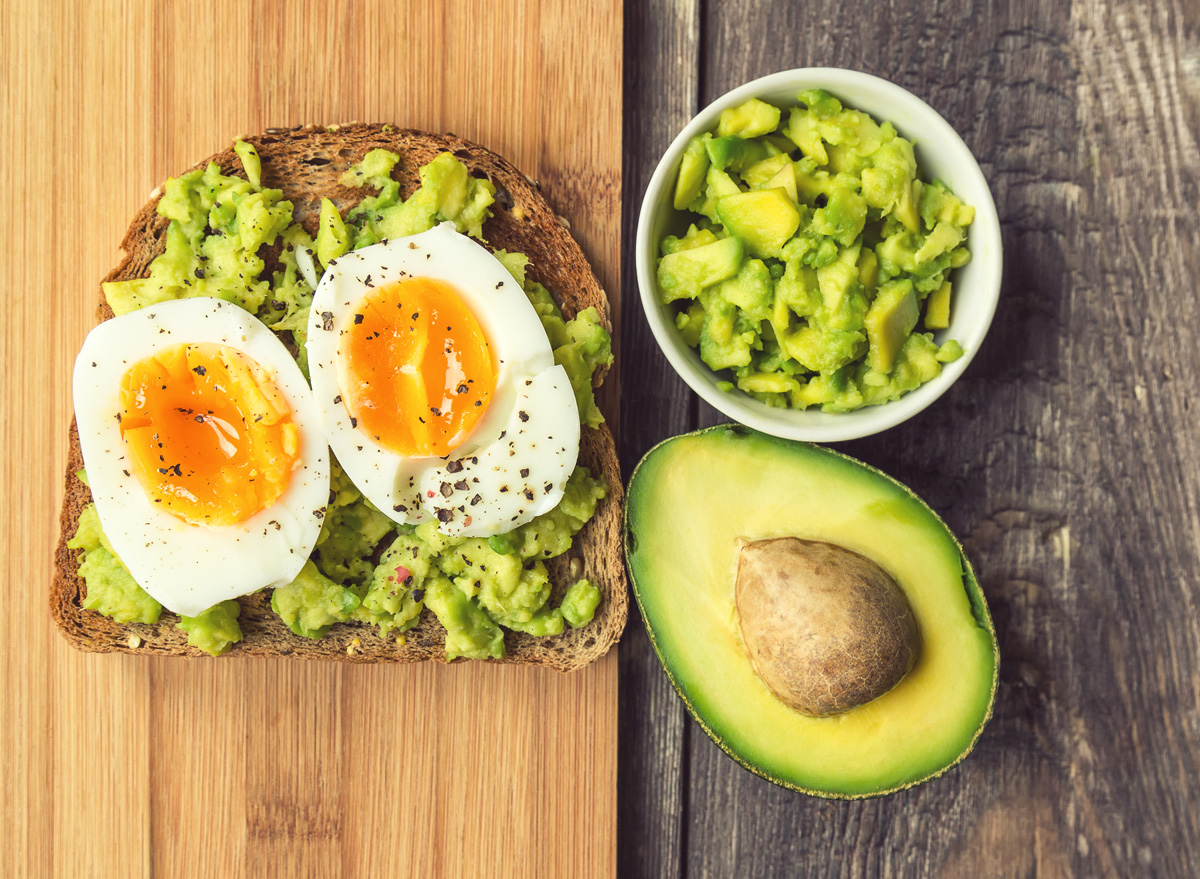
A woman's 40s can be an unexpectedly turbulent time. You may notice the pounds creeping up as your metabolism begins to slow and a few more aches or pains here and there. And, unfortunately, this is also the time in life when women may experience their first brush with chronic illness—and realize just how important their health will be moving forward. And that means women over 40 need to be even more mindful of what foods they're eating, too.
But your 40s aren't all doom and gloom—they just require a little adjustment. By taking charge of your diet and staying active, your 40s can be one of the best decades there is—a time to celebrate the strides you've already made in your career, family life, friend circle, and whatever else you've been building in your 20s and 30s. This is a great time to practice a little extra self-care, too, beginning with how you nourish your body.
That's why we talked to seven different doctors—including women's health experts, dermatologists, OB/GYNs, urologists, and general practitioners—to bring you the top 40 foods every woman over 40 should be eating, in order to feel and look your absolute best. And to make sure you're doing all you can, here are 40 Weight Loss Tips for Women Over 40, too.
Oily Fish
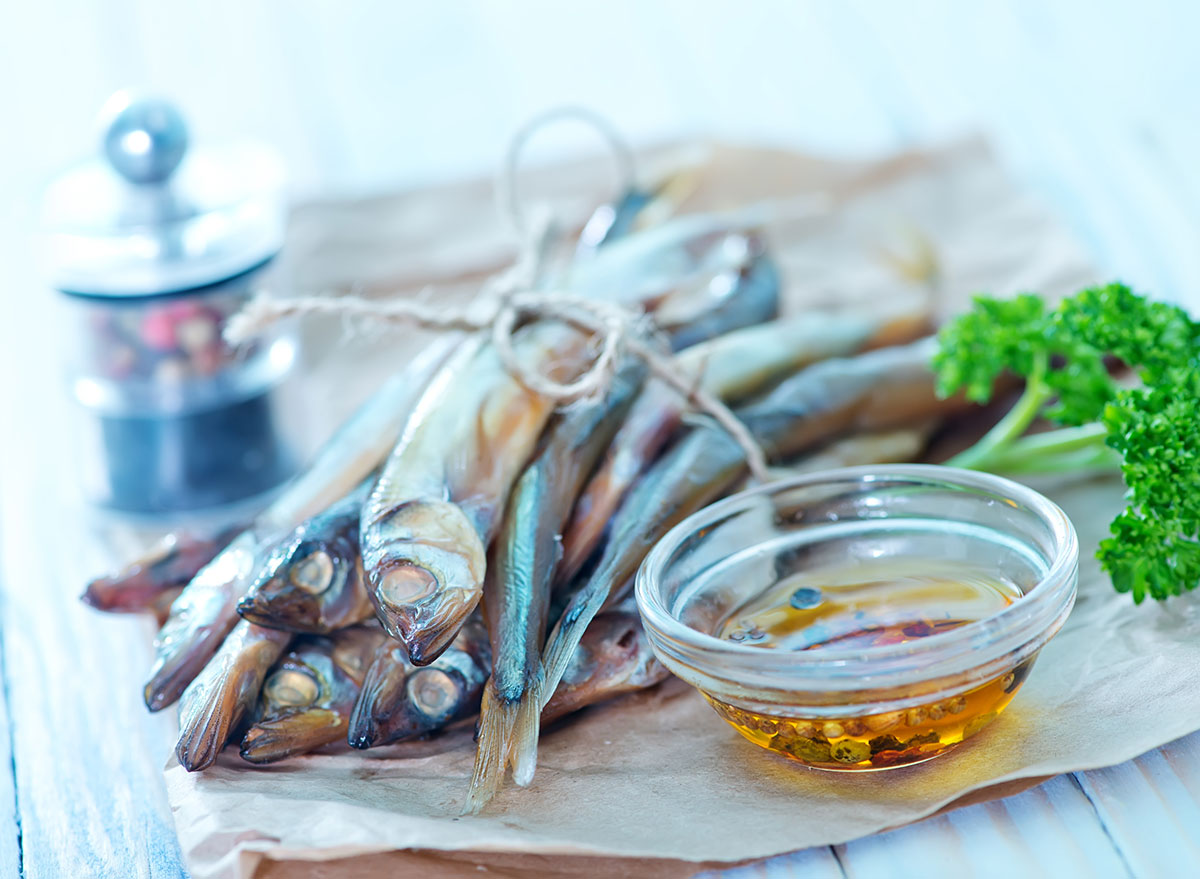
Most people think of heart disease as a men's health issue, but news flash: it's the leading cause of death in America for both men and women. Dr. Hardik Soni, MD, a physician and the Medical Director at Ethos Medical Spa in New Jersey, recommends that women incorporate Omega-3 rich fatty fish into their diet for good heart health as their age advances. He adds that healthy fats like those found in salmon, herring, and mackerel also help to balance hormones, which can tend to fluctuate after 40 in anticipation of menopause. And speaking of, here are the 25 Best Foods for Menopause.
Quinoa
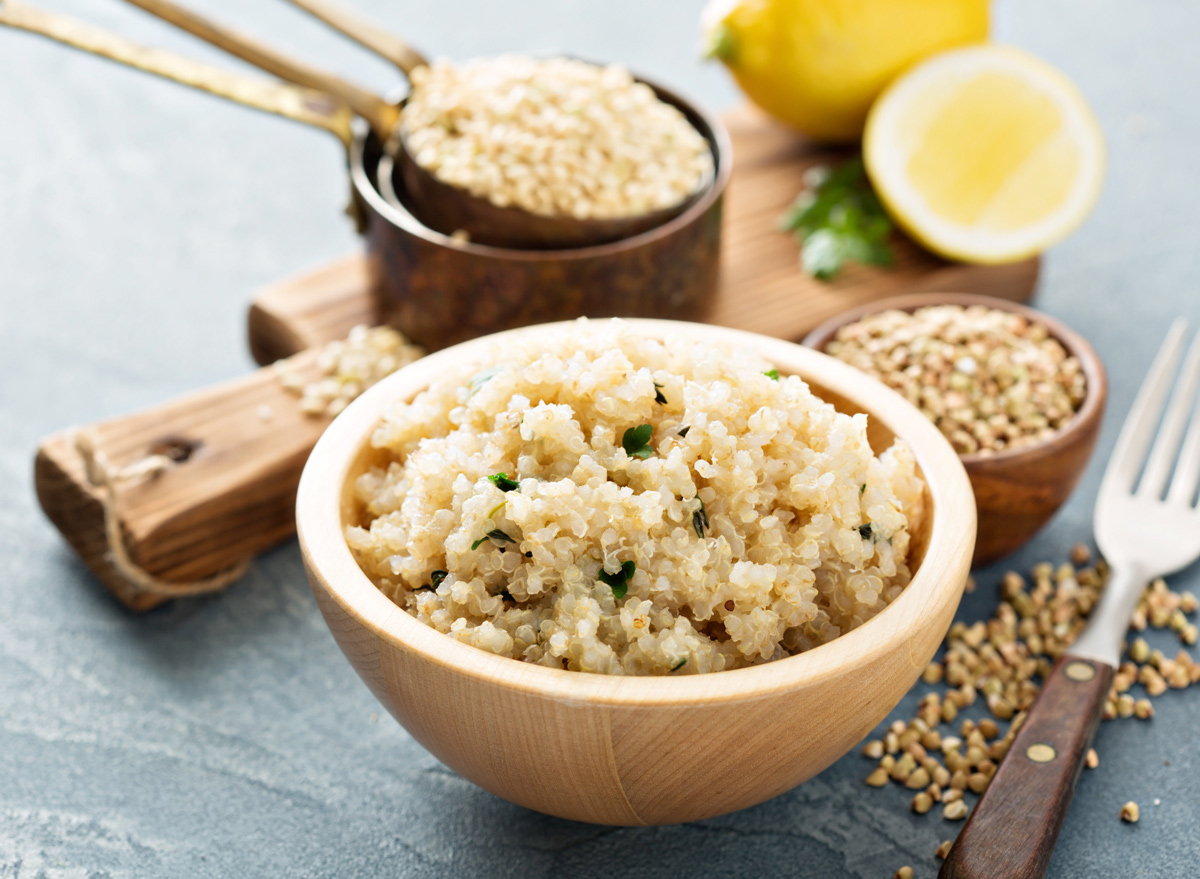
Dr. Sherry Ross, or Dr. Sherry as she's more commonly known, is an award-winning OB/GYN, women's health expert, and the author of the book She-ology: Women's Definitive Guide to Intimate Health. Period. In discussing her top foods for women, she called quinoa "the one you'd want with you on a desert island," due to its supercharged nutritional benefits. It's much higher in fiber than most other grains, high in protein, contains all the essential amino acids your body needs, and is rich in magnesium, iron, folate, and Omega-3 fatty acids. This translates into an impressive résumé of disease-preventing capabilities, lowering your risk of kidney stones, cardiovascular disease, diabetes, and even cancer.
Looking for ways to add more quinoa to your diet? Check out these 34 Quinoa Recipes for Weight Loss.
Grapefruit
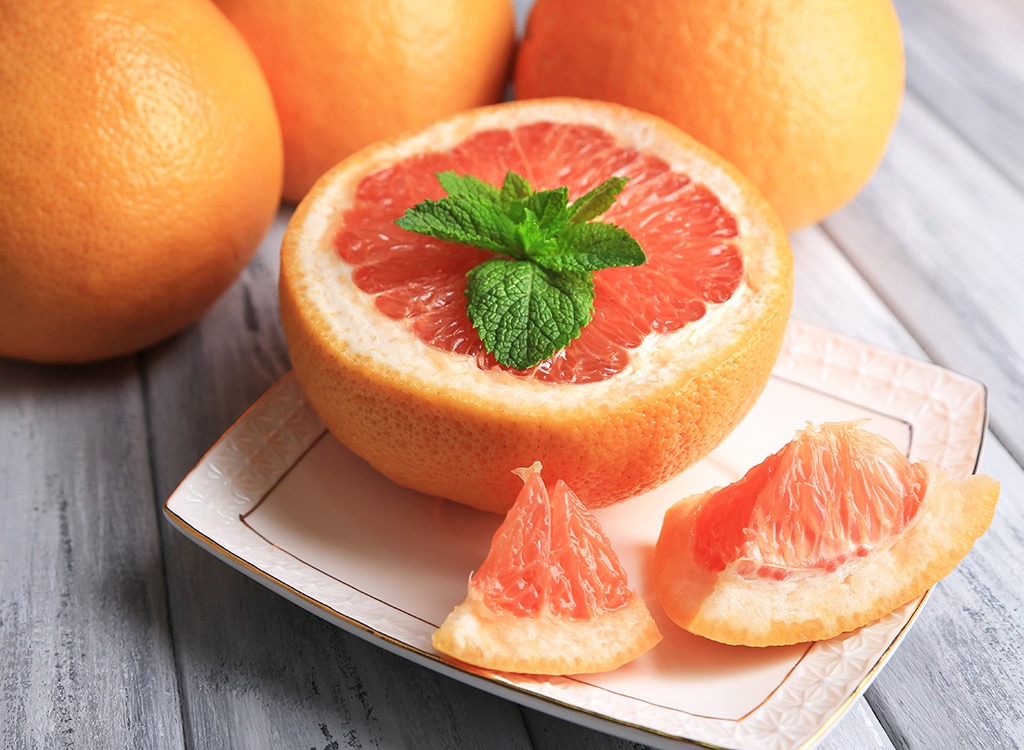
Not only is grapefruit a high-nutrient, low-calorie breakfast option, it's also one of the simplest ways to get your fill of folic acid—a key combatant of oxidative stress. Dr. Janette Nesheiwat, MD, a family and emergency doctor and the Medical Director of CityMD, recommends adding them to your diet, explaining that "they're loaded with vitamin C, potassium, vitamin B, zinc, manganese, and more. They also have antioxidant properties, which help fight inflammation in the body, can help lower cholesterol, and reduce your risk of heart disease, cancers, and dementia." They're also widely considered a useful tool for maintaining an active metabolism as you age. And in case you were wondering, here are the 9 Best Fruits for Weight Loss, Approved by a Nutritionist.
Peanut Butter
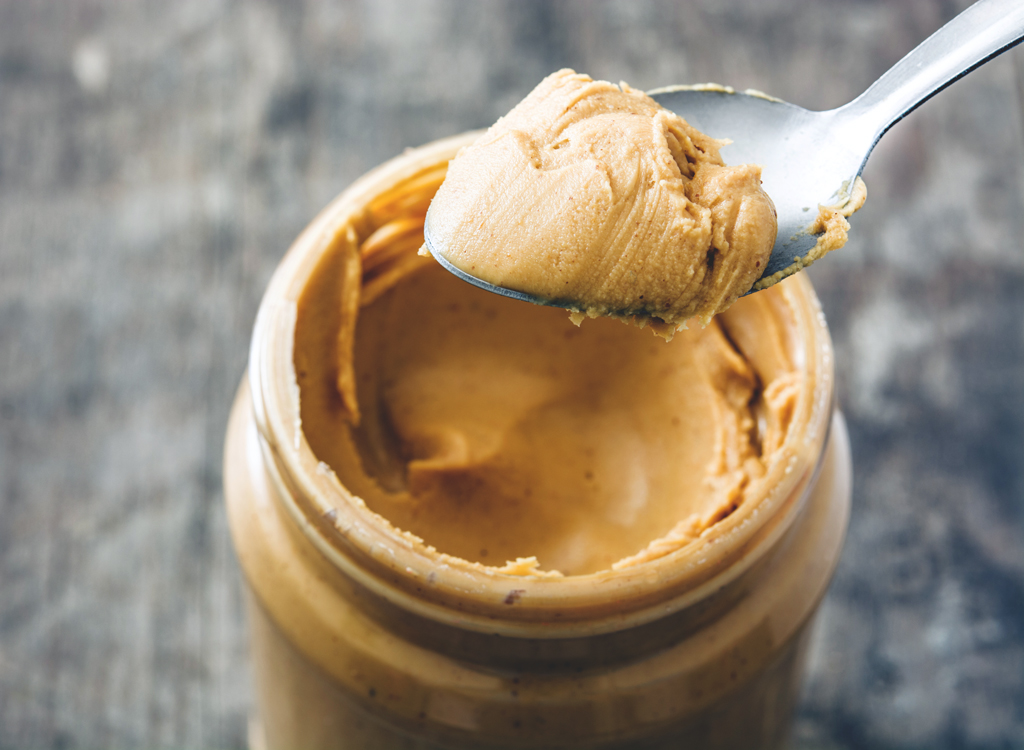
Looking for a protein-rich snack that will keep you full and give you an energy boost? New York-based dermatological surgeon Dr. Janet Prystowsky, MD, recommends eating peanuts and peanut butter if you're a woman over 40. "Plant-based protein sources allow you to decrease your consumption of animal-based protein sources such as red meat," she says. "There is evidence to suggest that heavy consumption of animal-based proteins will increase your cancer risk." Just be sure to reach for organic versions without added sugars, to avoid the extra calories, not to mention pesticides and preservatives.
Water
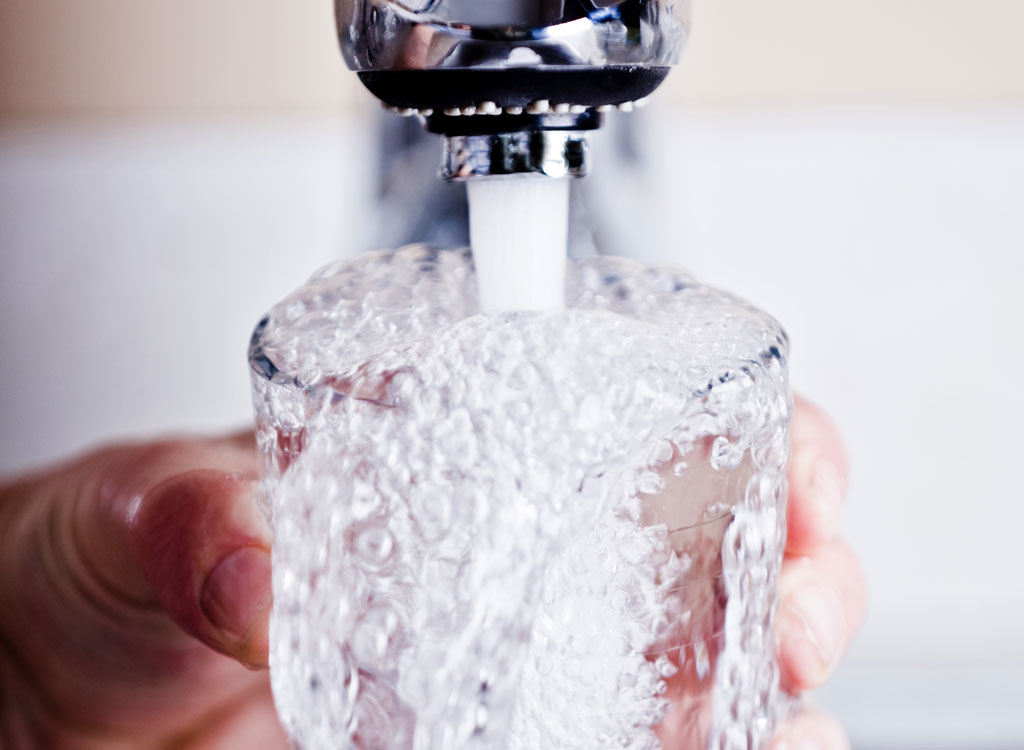
Hydration is key as we age, impacting every organ, cell, and tissue in our bodies. That's why Dr. Koushik Shaw, MD, who leads the team at Austin Urology Institute, highly recommends getting 6-8 glasses of water per day—more if you're working out. "You can tell if you're getting enough by monitoring the color of your urine," he says. "It should be light yellow. Dark yellow or orange is hyper-concentrated. Clear means you're drinking more than you need and you're basically just passing water at that point. But light yellow means you're adequately hydrated and your body is getting what it needs."
Read more: What Happens to Your Body When You Stop Drinking Water
Lemon Juice
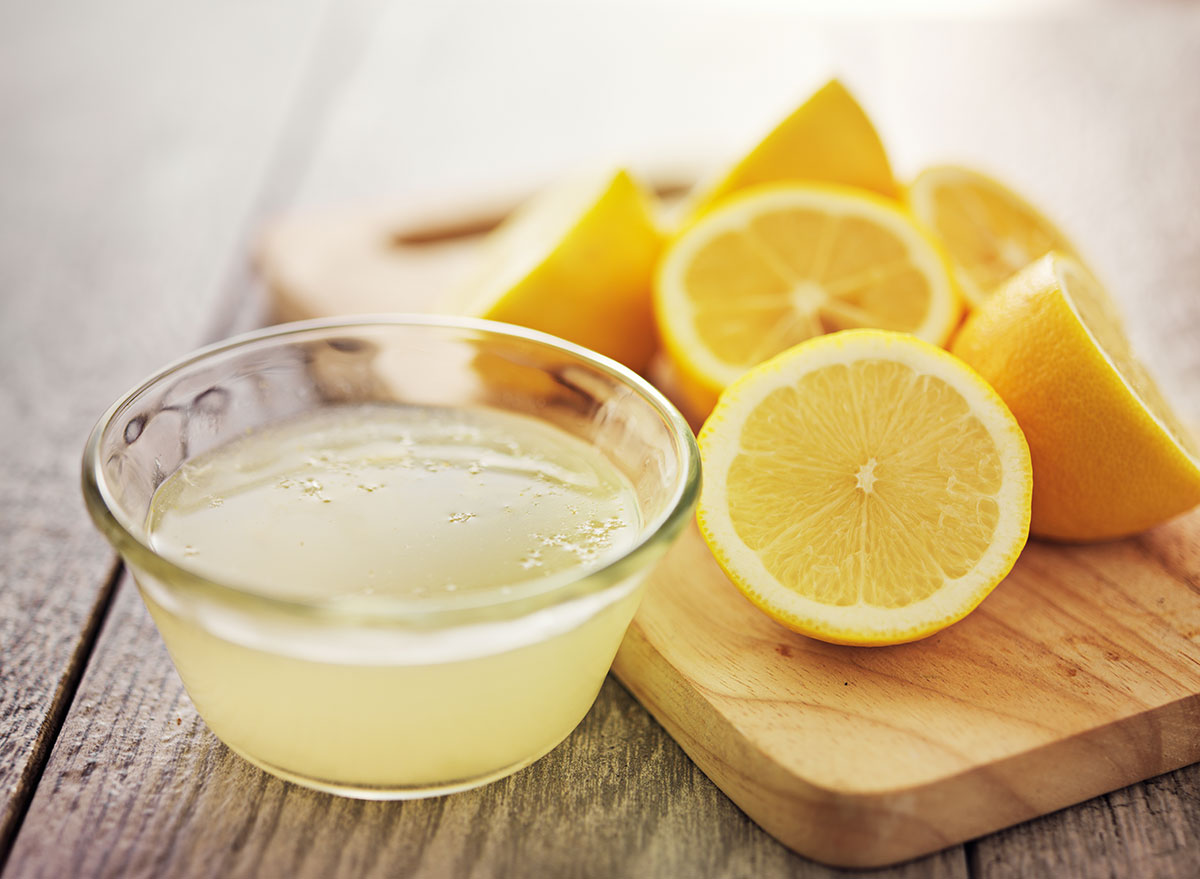
One way to ramp up your hydration routine is to add lemon juice to your water. Shaw explains it's a simple addition, but the benefits for women over 40 can be major. Lemon juice can help to break up concentrated calcium deposits, which are responsible for roughly 80-85 percent of kidney stones. This can be a very painful condition, affecting the whole urinary tract, and the risk for women increases as they approach their 50s. Get into the habit now for optimal kidney health!
Broccoli

Broccoli is a superfood with a whole host of benefits for your health. As Dr. David Greuner, MD of NYC Surgical Associates explains, "This vegetable's nutritious vitamins and minerals serve many purposes, including immune system defense, reduced stress-related aging signs, and a lowered risk of cancers in the breasts, bladder, and stomach," he says. Dr. Sherry agrees that it's a top food for women in their 40s, noting that it's high in vitamin K and calcium, both of which are helpful to women's bone health as they get older.
And while broccoli is one food you should eat more of, here are 13 Foods Women Should Never Eat.
Dark Leafy Greens
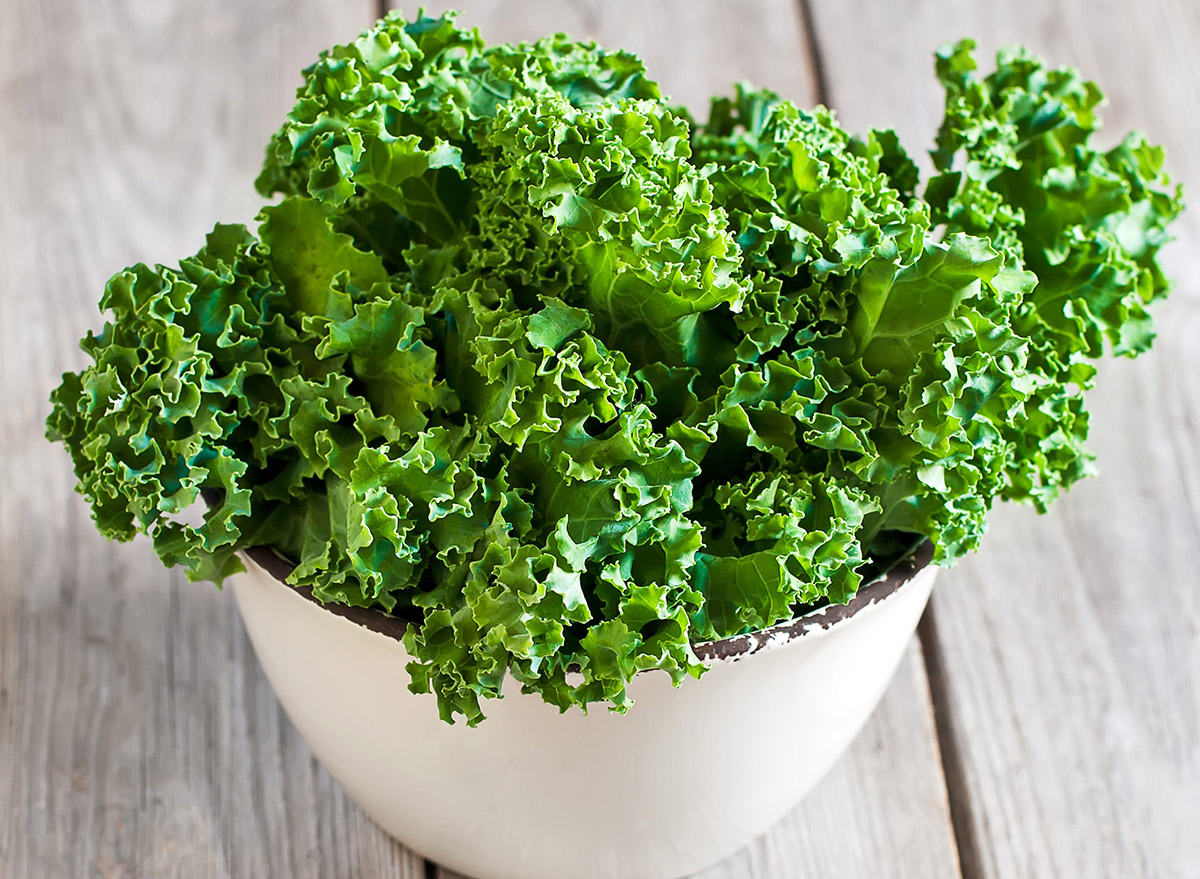
Dark leafy greens like spinach, kale, swiss chard, and collard greens might be some of the most nutritionally-potent foods that women can eat as they grow older. These greens are high in vitamin K, which helps strengthen bones and fight osteoporosis, provide antioxidants that help prevent cancer, and they're rich in vitamin C. Soni points out that beyond their broader contributions to good health and fitness, leafy greens can also provide an unexpected benefit for many women over 40: "Vitamin C is essential, as it can help your brain to form dopamine," he explains. This helps combat perimenopausal depression, a common symptom that many women face as their hormones first begin their hormonal transition, beginning in their 40s.
Sweet Potatoes

According to Shaw, you may find in your 40s that your skin, hair, and nails are in need of a little extra care—and one of the best vitamins for keeping them strong and healthy is the B vitamin biotin. Liver is one of the few food sources with a higher yield of biotin, but it's also a tougher sell for many people, and, of course, it's key to eat foods that you enjoy so that you can form healthy, sustainable dietary habits. Sweet potatoes have the added benefit of not just biotin, but also being rich in beta-carotene (which has important anti-inflammatory properties), as well as vitamin C and magnesium.
And for what else you should be keeping tabs on, here are 10 Nutritional Deficiencies Women Should Watch for in Their 40s.
Flax Seeds
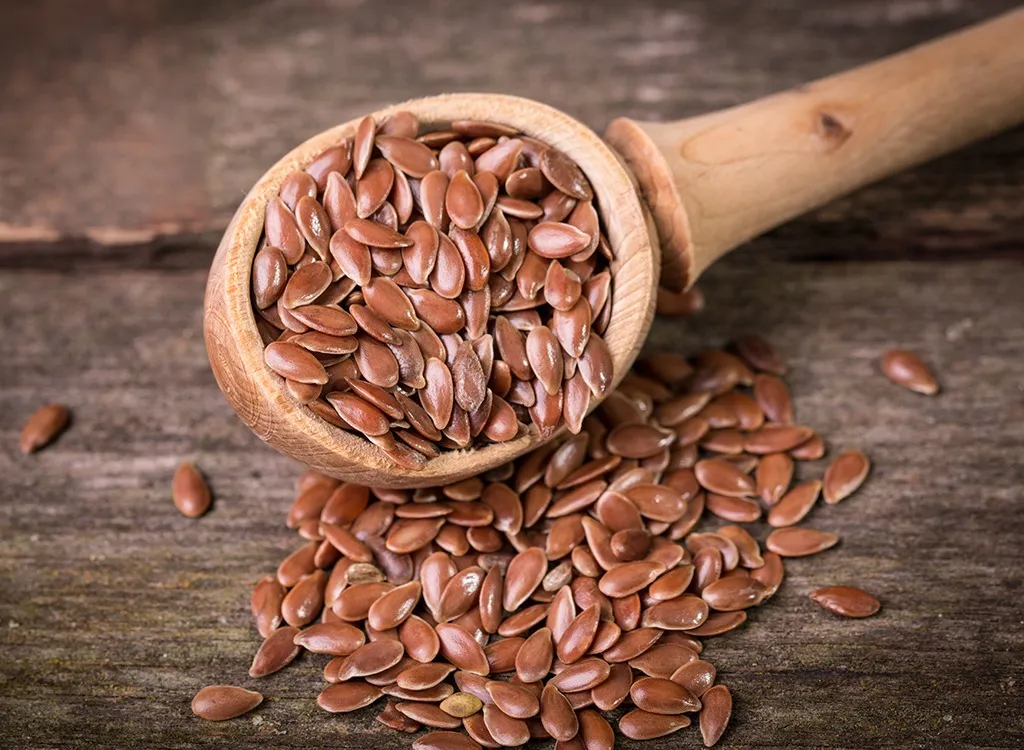
According to Dr. Cynthia Bailey, MD, a dermatologist and the CEO and Founder of Dr. Cynthia Bailey Skin Care, freshly ground flax seeds are an anti-aging superfood that can have a profound effect on our skin and overall health. She explains that they owe their success to having some of the highest content of Omega-3s in any plant-based foods.
"Omega-3 fatty acids have been shown to help keep skin looking young by fending off wrinkles, age-related dryness, and skin thinning. They also help skin stand up to UV damage," she explains. And it's not just your skin that stands to benefit. "Flax seeds are rich in antioxidants, vitamins, minerals, fiber, and plant lignans needed to maintain healthy gut bacteria (microbiome). The amount of fiber in flax is significant, helping with regularity, too. Omega-3 fatty acids also help fight heart disease, inflammation, and cancer. They are truly a superfood."
Green Tea
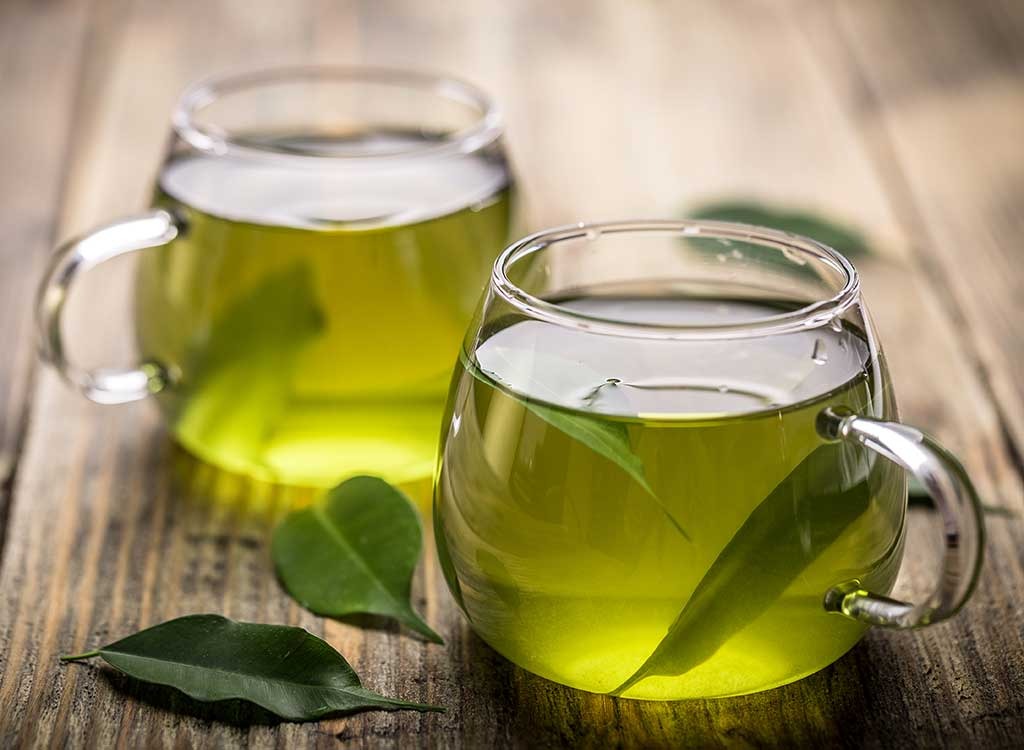
The term "free radicals" may sound fun, but it actually describes cell-damaging, unstable molecules that can lead to oxidative stress. One study on the topic explains that because free radicals are a byproduct of normal body functions like breathing, as well as environmental factors, "reactions are expected to produce progressive adverse changes that accumulate with age throughout the body." That's why Soni recommends green tea as an addition to your daily routine. "Green tea has plenty of antioxidants which can help protect us from free radicals," he explains. "And if we can get patients to drink green tea rather than coffee or alcohol, it is going to have that much more of a positive effect."
Need more proof? Well, here are the 7 Health Benefits of Drinking Green Tea.
Asparagus

According to Dr. Sherry, "We know the hormonal imbalance that comes with perimenopause affects the balance of our GI tracts. As we age, this hormonal disruption affects how our bowels function." Because of this, she explains, bloating and swelling are not unusual for women over 40. "It feels similar to PMS, but magnified times ten as we get into perimenopause," she says. Dr. Sherry recommends regularly adding asparagus to your menu: being a natural diuretic, it can help to reverse these uncomfortable symptoms.
Avocados
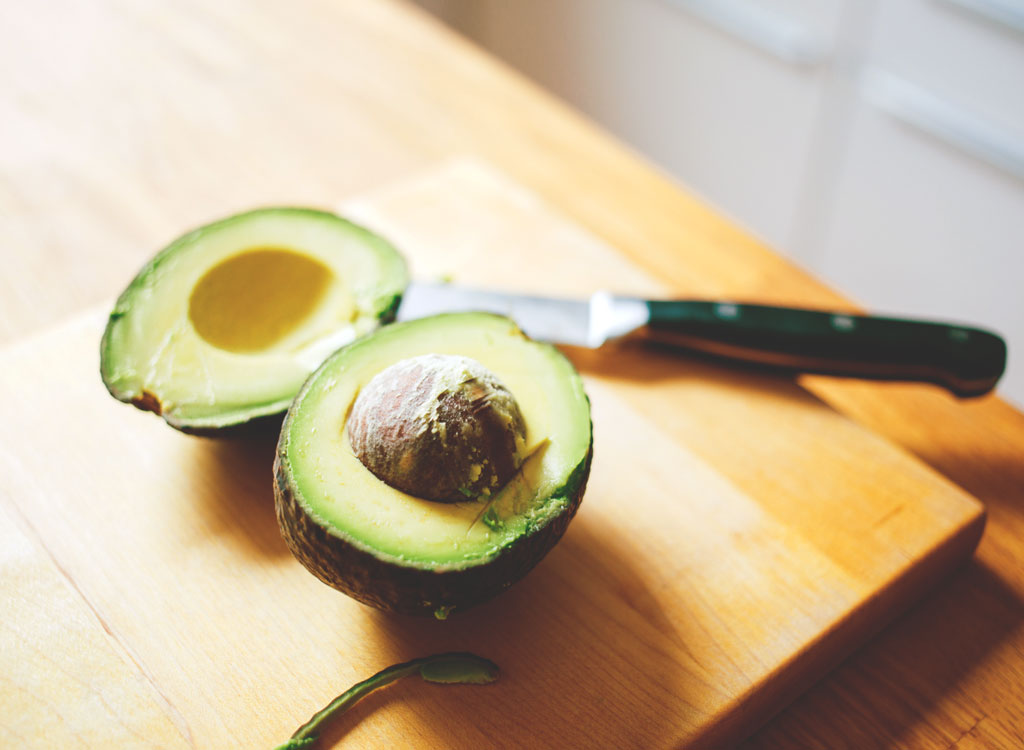
Avocados provide a range of health benefits as you age, and Soni recommends adding them to the menu if you're a woman over 40. Eaten regularly, studies show that avocados can help regulate cholesterol levels, improve digestion, support joint health and agility, promote eye health and good vision, and maintain a healthy weight. It doesn't hurt that they're also great for your skin, with antioxidants that fight free radicals that cause wrinkles, and oils that moisturize your skin from the inside out for a healthy glow.
Lentils
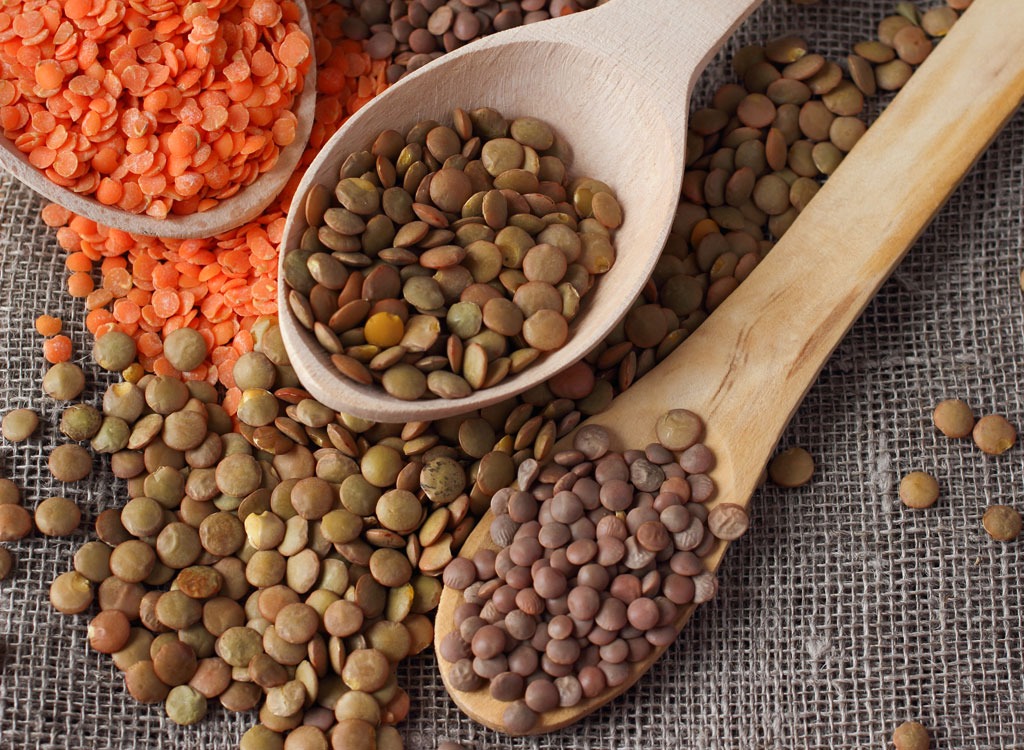
Eating a diet that's rich in protein is a great way to maintain a healthy weight and muscle mass during your 40s. Unfortunately, according to Prystowsky, "There is evidence to suggest that heavy consumption of animal-based proteins will increase your cancer risk." Her solution? Eating more lentils (as well as other legumes and beans) as a protein-rich, plant-based alternative to meat products. They also provide the benefit of being particularly high in fiber, and a great source of complex carbohydrates—both of which should work harmoniously with your overall weight loss or weight maintenance goals.
Red Wine
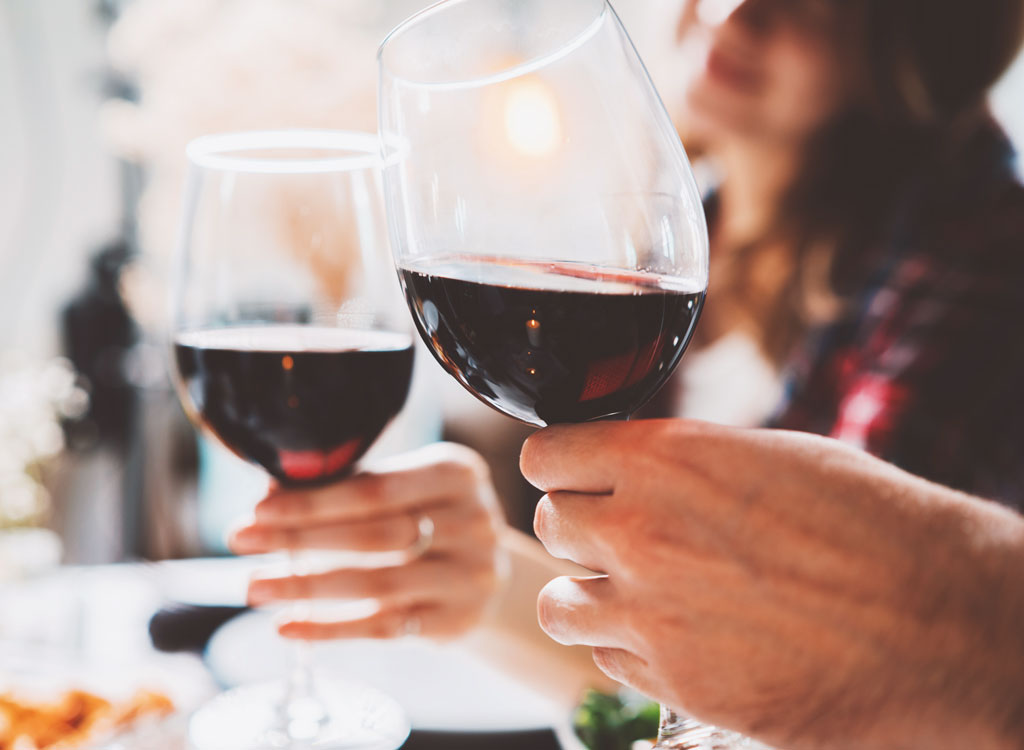
According to Soni, drinking red wine can raise women's estrogen levels, which can help balance their natural decline after the age of 40. Studies suggest that this benefit comes from the antioxidants found in red grape seeds and skins, and that drinking one five-ounce glass per day can help lower a woman's risk of developing breast cancer, compared with drinking white wine. That's great news, considering one in eight women will battle breast cancer in her lifetime. And FYI, this is exactly What Happens When You Drink a Glass of Wine Every Night.
Apples
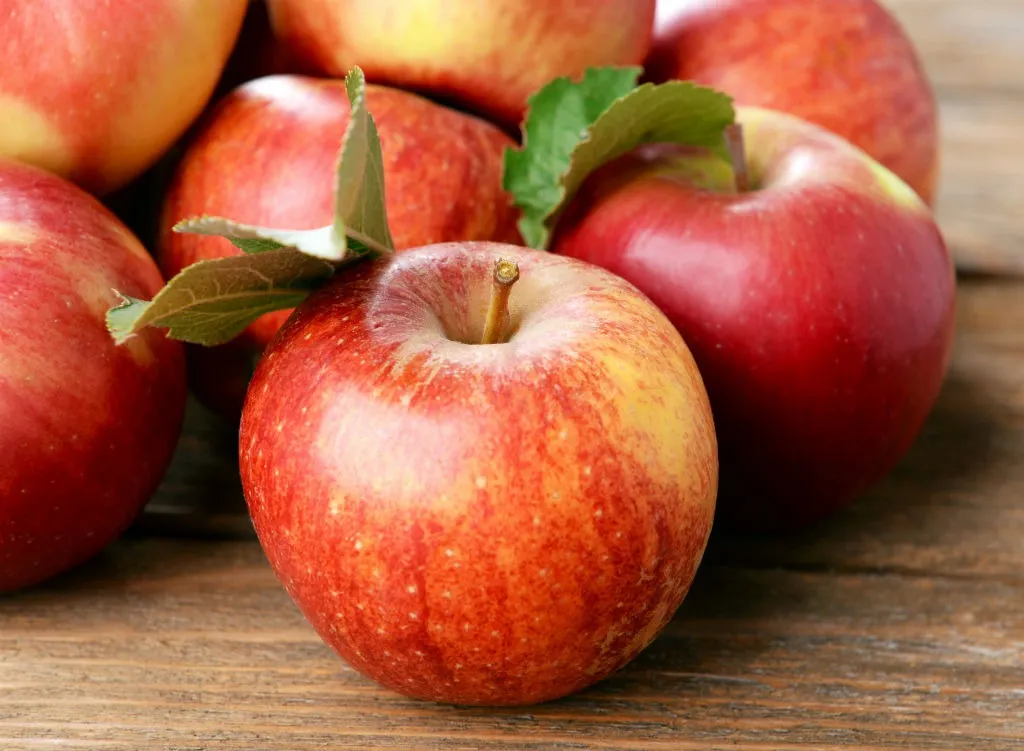
Diverticulitis is rare in people under the age of 40, but according to Harvard Health Publishing, one-third of Americans develop the condition by the time they reach 60. It occurs when small pouches form inside of a person's digestive tract, typically in the lower part of the large intestine. The effect on the patient? Abdominal discomfort and constipation. Shaw recommends eating fruits like apples, which are high in soluble fiber and pectin, which can soften the stool to reduce those uncomfortable diverticulitis flare-ups.
Brazil Nuts
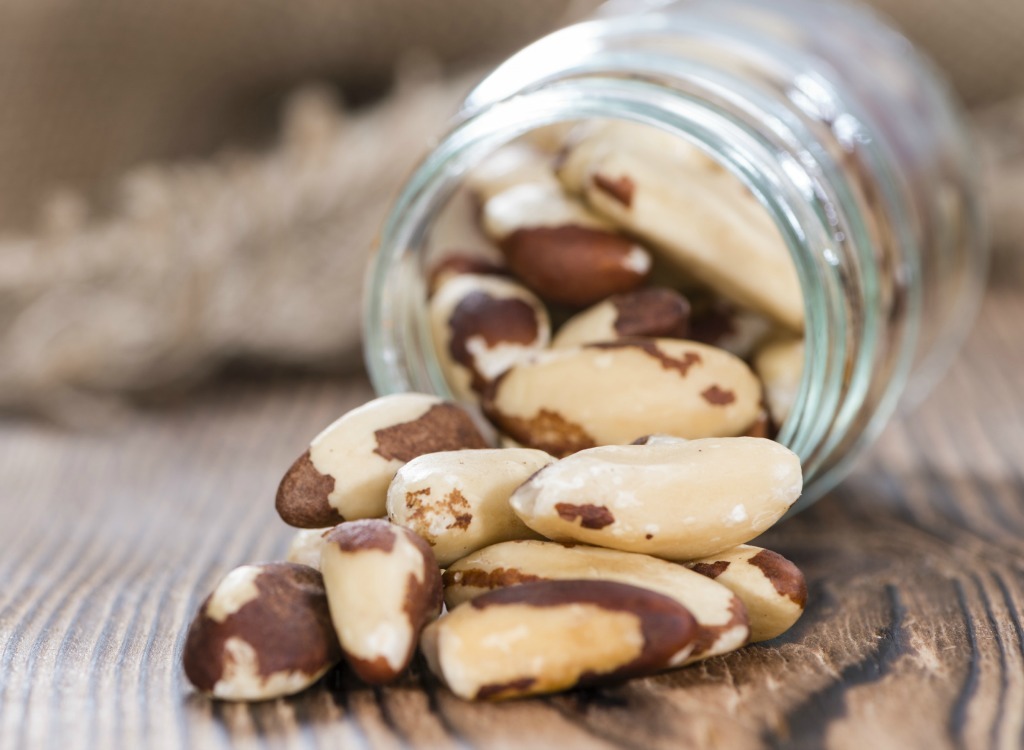
High on Soni's list of healthy foods for women over 40 are nuts. They have plenty of polyunsaturated and monounsaturated fats that can help lower your LDL, or "bad cholesterol," which in turn can help lower your risk of a heart attack. Though a small handful of your more common options like walnuts, almonds, pistachios, or cashews all make a healthy, high-protein snack, Soni recommends Brazil nuts in particular. These contain high levels of the antioxidant selenium, which can help defend against chronic illness, including age-related kidney disease, heart disease, and cancer.
Oatmeal
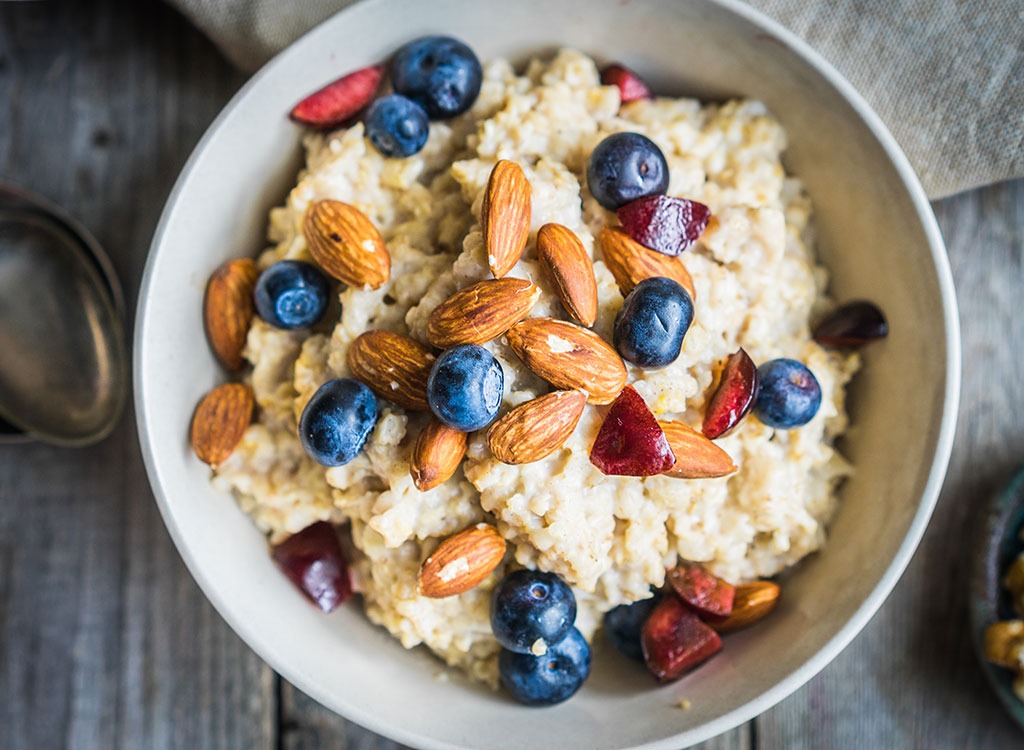
As women get older, they often find that the things they could eat in their 20s and 30s suddenly leave them feeling weighed down in their 40s. And all too often, the knee-jerk reaction is to cut out all carbs in response. Shaw explains that while it's a great idea to reduce your intake of simple carbs, complex carbohydrates are still important for your health, and a sound component of a weight loss plan in your 40s. High-fiber oatmeal is an excellent source of complex, slow-releasing carbohydrates, to keep you fuller for longer, while avoiding the inevitable energy crash associated with eating refined carbs or no carbs at all.
Olive Oil
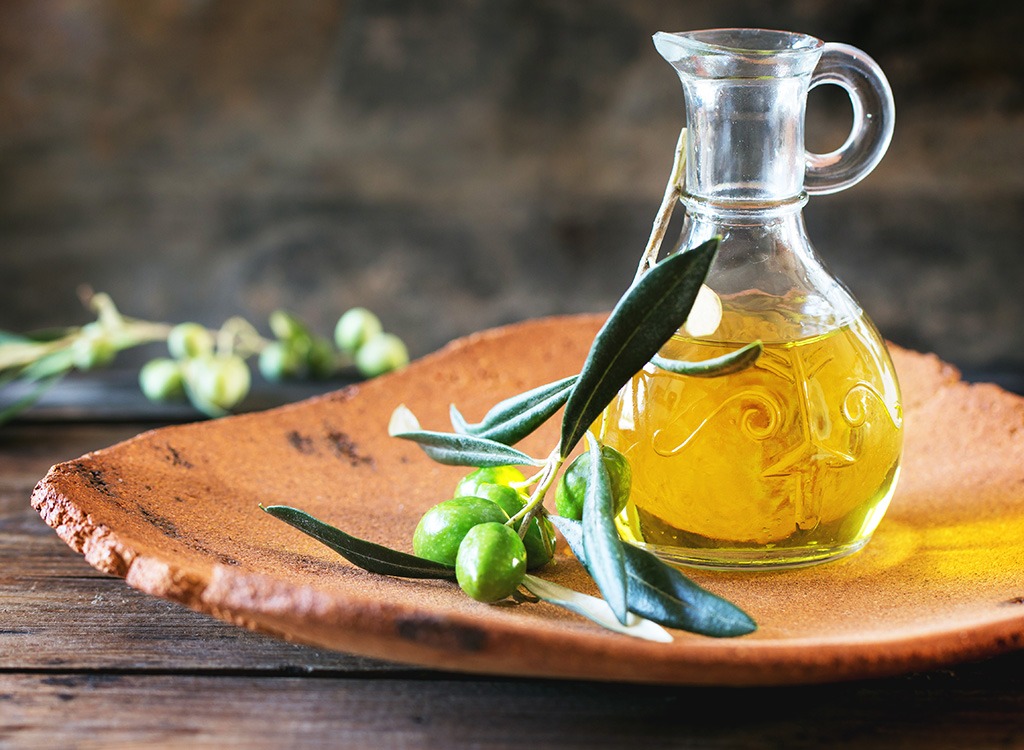
Olive oil came up a lot while speaking to doctors about women's diets after 40. "We all use oil to cook, so it should be healthy oil whenever possible," says Dr. Sherry. "Olive oil is antioxidant, probiotic, and good for your gut." Shaw agrees, adding that olive oil was a good way to cut down on "the fake, unhealthy" options like margarine and vegetable oil. He notes that it can be especially effective as part of a Mediterranean-style diet, which emphasizes plant-based foods like fruits and veggies, nuts, legumes, healthy fats, and whole grains.
Eggs
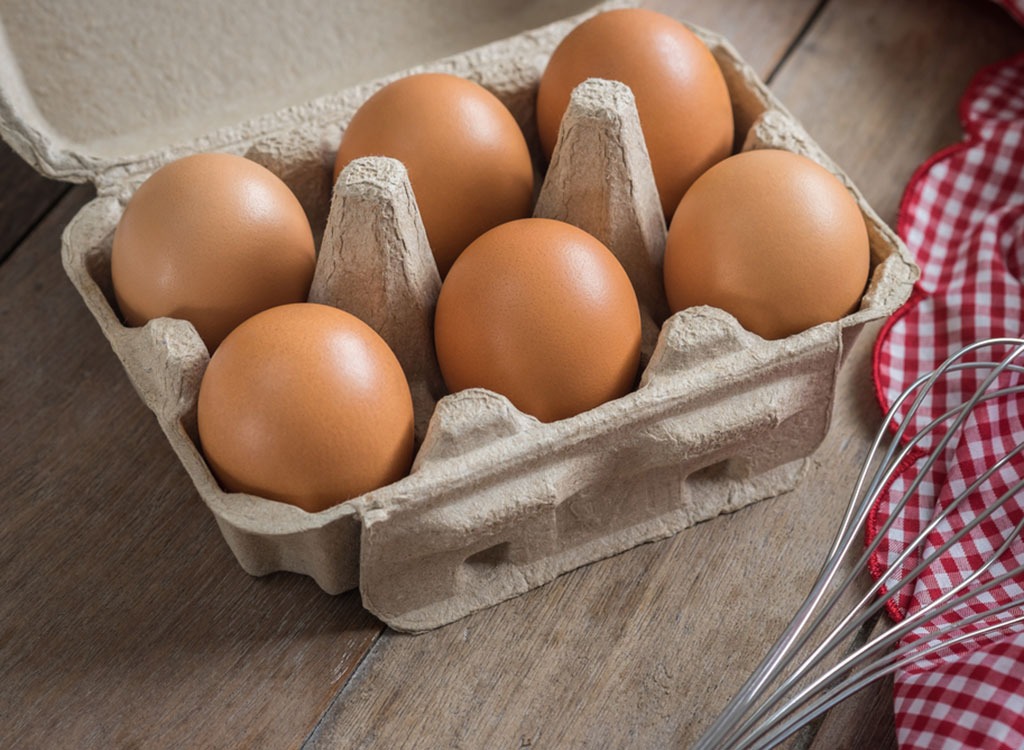
Sarcopenia is the condition of losing muscle mass as we age, an ailment that leaves many elderly people frail and vulnerable to injury and malnutrition. If you think 40 is too young to worry about such a condition, think again: many of us begin to lose muscle mass as we enter our fourth decade, but don't notice it until far later, when it begins impacting quality of life. By then, it's difficult to reverse the effects. That's why it's essential to get regular exercise, and eat protein-rich foods like eggs, which studies have proven helps build muscle. Need another reason to whip up your morning omelet? "Eggs are also a top anti-wrinkle food, containing three outstanding amino acids: proline, glycine, and lysine," says Soni. And here are 20 More Reasons Eggs Could Be Your Secret Weight Loss Weapon!
Garlic

It's a good thing you can toss a pinch of garlic into just about any savory meal. According to Greuner, "Due to the chemical reaction that it has on red blood cells, garlic is essential for improved blood flow and the fight against bacterial and viral infections. Additionally, garlic's vitamins and minerals have been linked to reduce blood pressure, blood sugar, and cholesterol, making it an ideal heart disease prevention tool for women as they reach midlife." Dr. Sherry seconds the recommendation, citing its powers as a natural diuretic and its subsequent ability to fight bloating and fluid retention from the wild hormonal shifts of your 40s.
Skinless Chicken
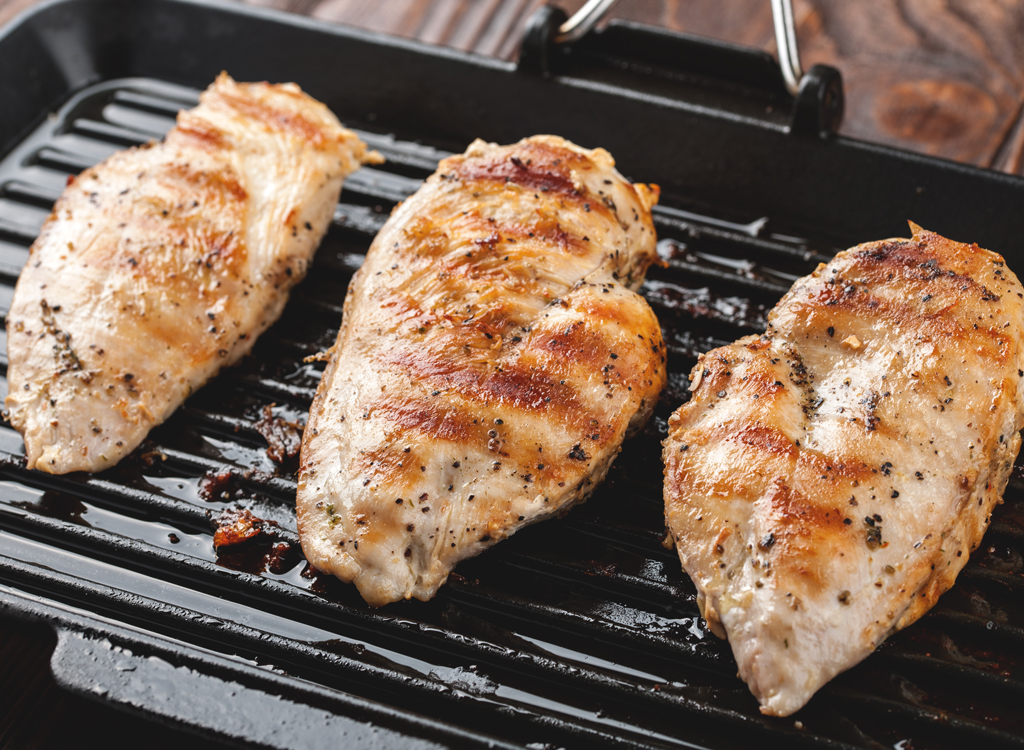
Eating chicken breast—ideally without the skin, for less saturated fat—is a great way to boost your metabolism and maintain a healthy weight. "It is a common complaint from female patients over 40 that they find they gain weight much more easily than they used to when they were younger," shares Soni. "This is a natural occurrence, as our metabolism-charging muscles begin to waste away after 30. The number one metabolism booster available is protein, yet women tend to start eating less than their RDA of protein as they age." Luckily, it's easy to incorporate grilled chicken breast into just about any savory meal, giving you the lean protein boost your metabolism needs.
Green Beans
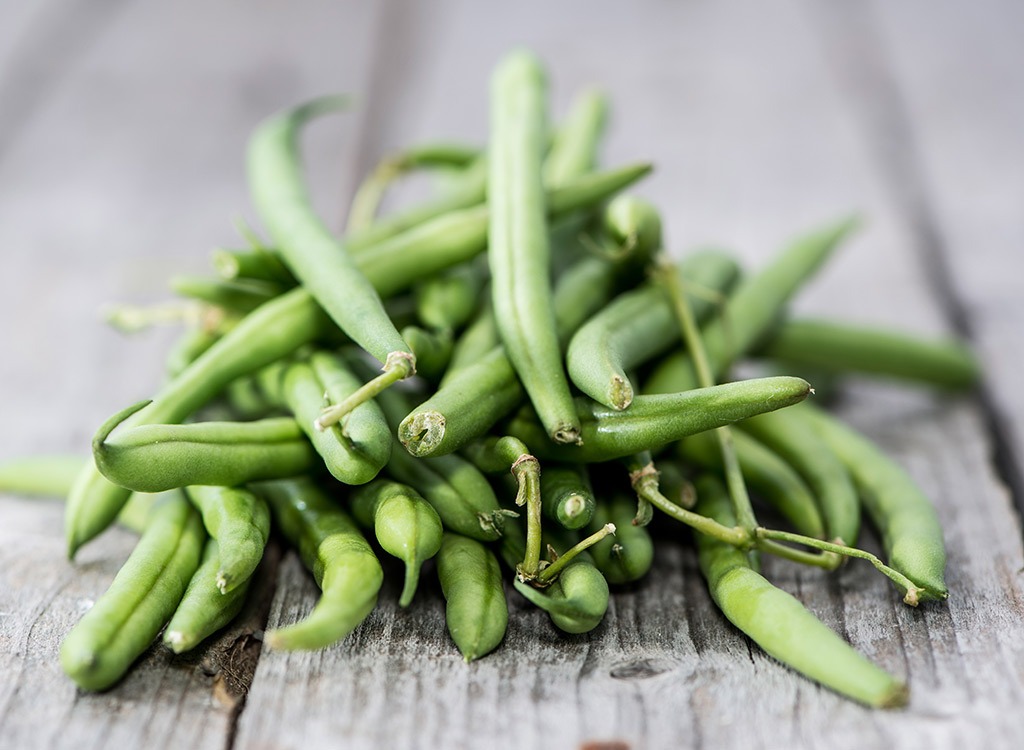
According to Nesheiwat, one of the best ways to maintain good health as we age is to eat heaps of green veggies. "They say you are what you eat, and there's definitely some truth to that," she says. "We obtain essential vitamins and minerals through our diet—especially through fruits and vegetables." While she suggested leafy salads, broccoli, and more, green beans were at the top of her list, explaining that they're a great food for preventing colon cancer. That's great news, considering that colorectal cancers are the second leading cause of cancer-related death in America.
Chia Seeds
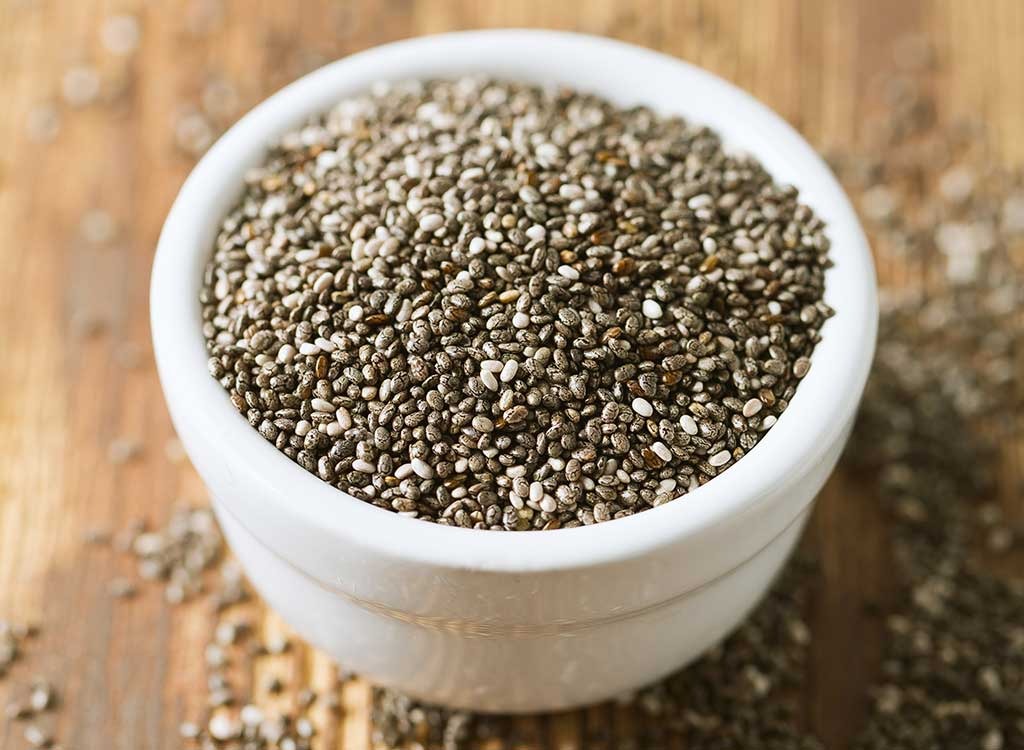
Chia seeds are considered a "superfood" with a mile-long list of health benefits, most notably those derived from its high content of Omega-3 linoleic fatty acids, calcium, fiber, antioxidants, and protein. They pack a major nutritional punch without being calorically dense, helping older people maintain bone density, organ function, and muscle mass, all while maintaining a healthy weight. Soni adds that women over 40 may also notice that chia seeds can help menopausal symptoms, including having a stabilizing effect on mood swings!
Turkey
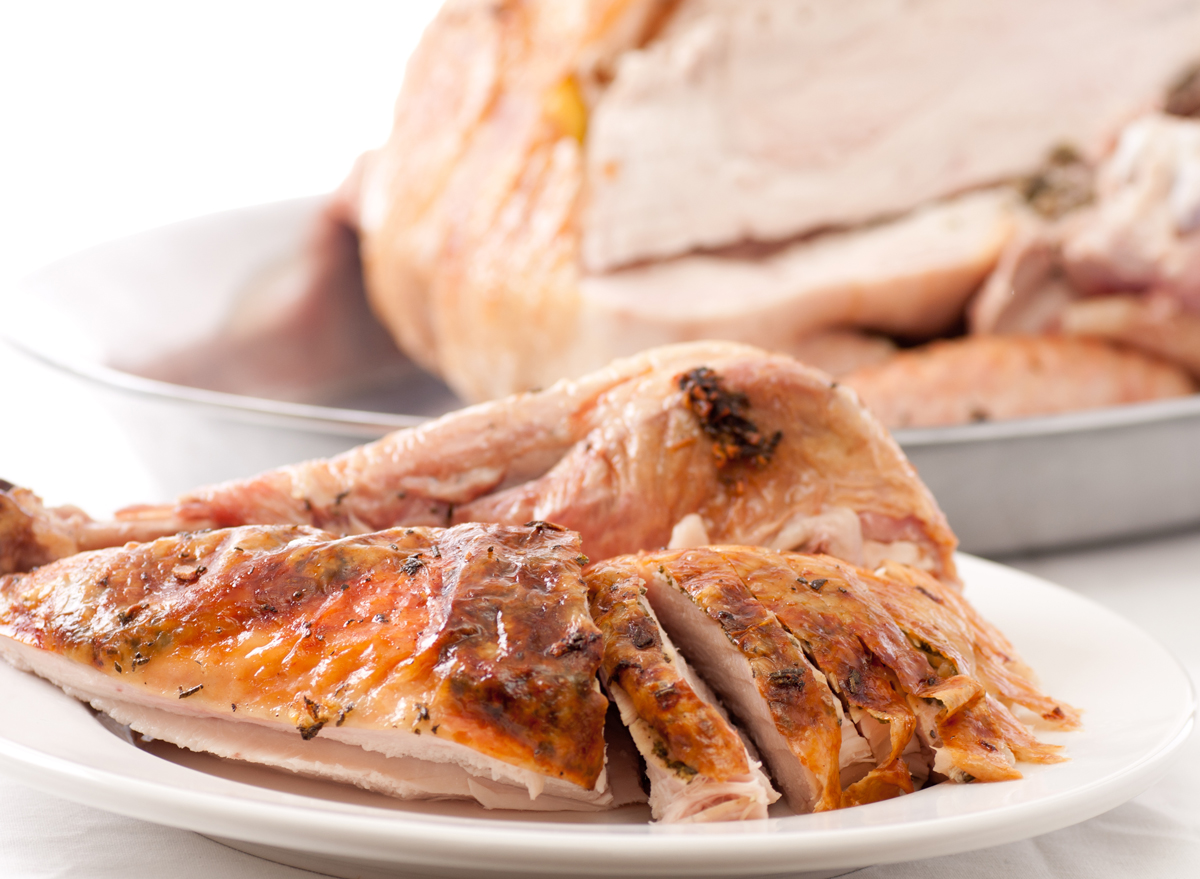
As Shaw points out, women in their 40s and beyond may start to notice changes to their sleeping habits, clocking fewer hours of rest as they age. The tryptophan found in turkey is an amino acid that helps to form the B vitamin niacin, and generates serotonin. According to The National Sleep Foundation, this may contribute to a better night's sleep, particularly if you pair your turkey with complex carbohydrates, which help the tryptophan reach your brain by absorbing other amino acids from your blood.
Unprocessed Soy

Soy has been at the center of nutritional controversy for some time. Detractors argue that because the isoflavones contained in soy mimic estrogen, they could feasibly contribute to the development of breast cancer. But studies suggest that those same isoflavones actually slow the growth of breast cancer cells when women consume soy in moderation. Dr. Sherry recommends eating unprocessed soy, including soybeans and tempeh, explaining, "it all depends on the type of soy you're consuming. Unprocessed soy has way more benefits than processed soy: it's got Omega-3 fatty acids, protein, and fiber. In its natural form, it's a good tool for dietary prevention of breast cancer." So what should you stay away from? "Soy milk, soy cheese, and soy yogurt would be less helpful‒maybe even counterproductive in that processed form," she says.
Cottage Cheese
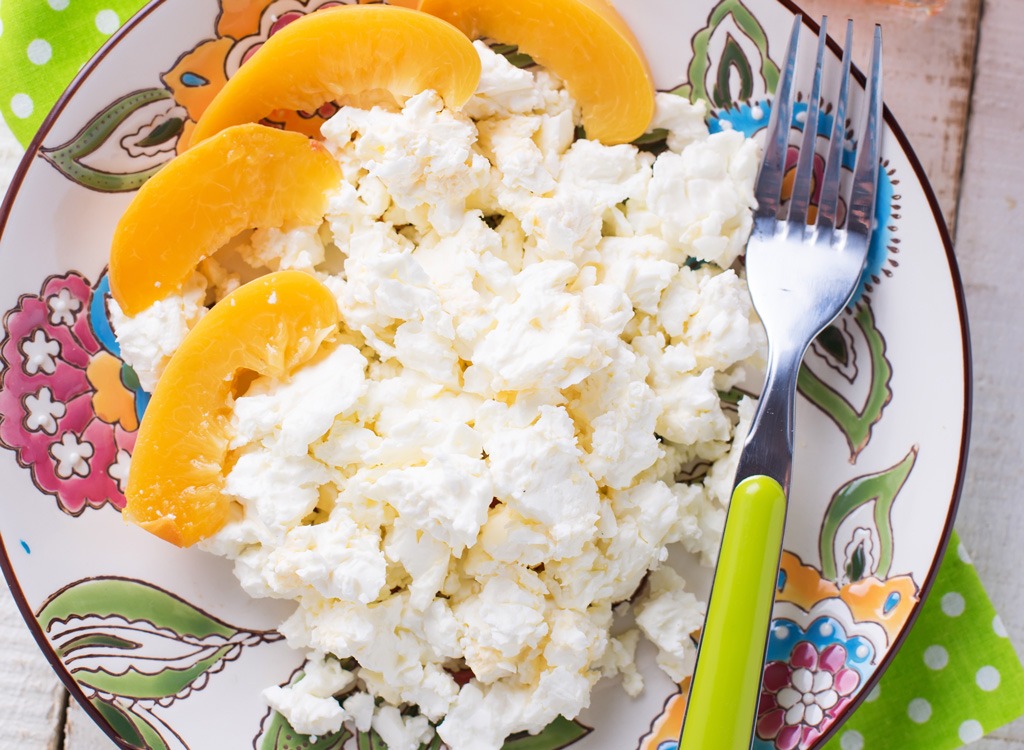
Cottage cheese is known for being an excellent, low-fat source of protein and calcium. But it also offers some lesser-known benefits: it's rich in selenium for reduced oxidative stress, riboflavin for breaking down the nutrients in your food, phosphorus for bone health, and vitamin B12 for a healthy nervous and circulatory system. Soni adds that cottage cheese can also be a good source of tryptophan for better sleep, if you're looking to cut down on meat products and skip the turkey.
Berry Smoothies
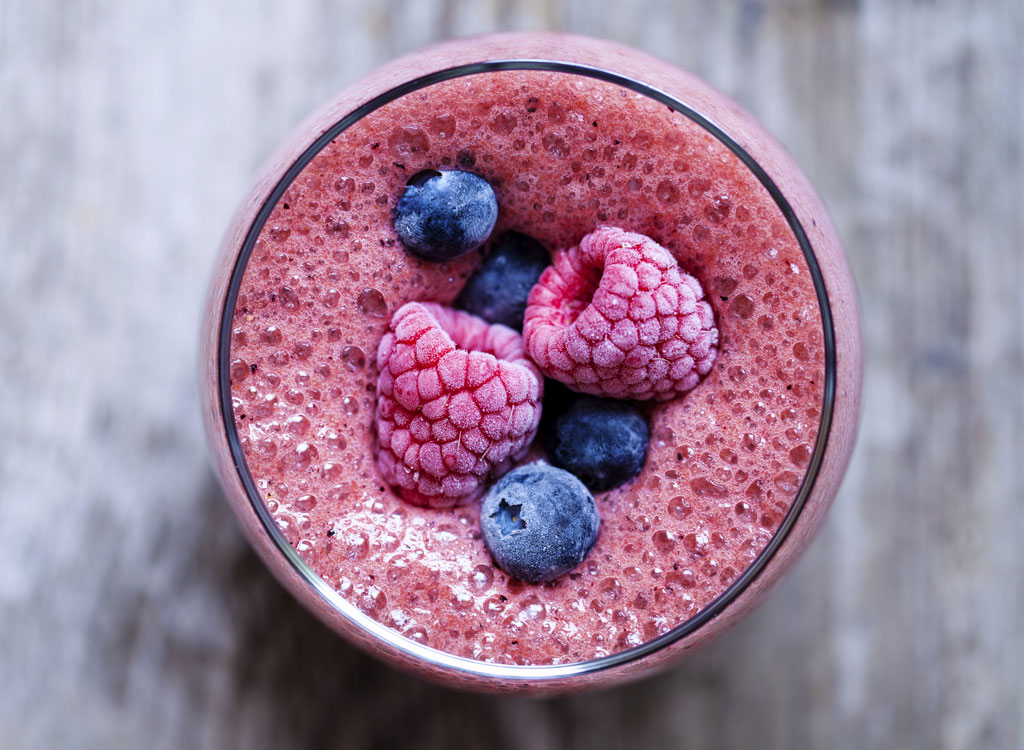
Berries—especially dark berries like blackberries and blueberries—are some of the best anti-aging snacks around. They're packed with flavonols and anthocyanins, which help protect your cells and ward off disease. They're also full of antioxidants, which studies show can help slow the aging process. Shaw recommends adding goji berries, which have the added benefit of reducing your risk of age-related eye diseases, like glaucoma. If berries aren't already a part of your regular diet, it's time to fire up the blender.
Whole Grain Pastas and Cereals
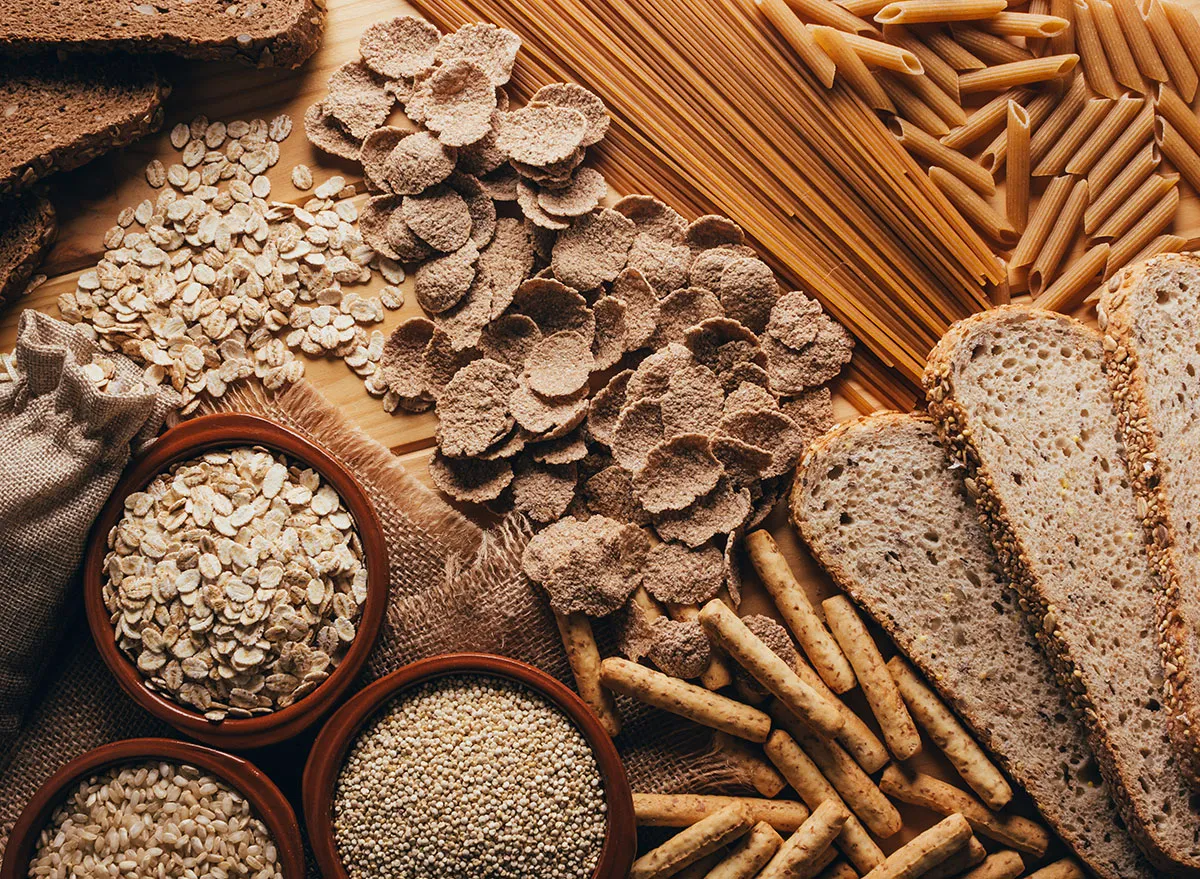
If you've nixed pasta from your post-40 diet for fear of gaining weight, it's time to reconsider. The trick is just to buy the right kind, and eat it in moderation. According to Greuner, whole grain pastas and cereals can be a very effective part of a woman's weight loss or weight maintenance regimen, and it has some added benefits for our digestion. "As we age, digestive health and regular bowel movements become increasingly relevant, as older adults tend to experience constipation more frequently," he says. "The intake of fiber-rich grains is crucial for avoiding constipation, as well as reducing weight-gain and bloating."
Organic Meat
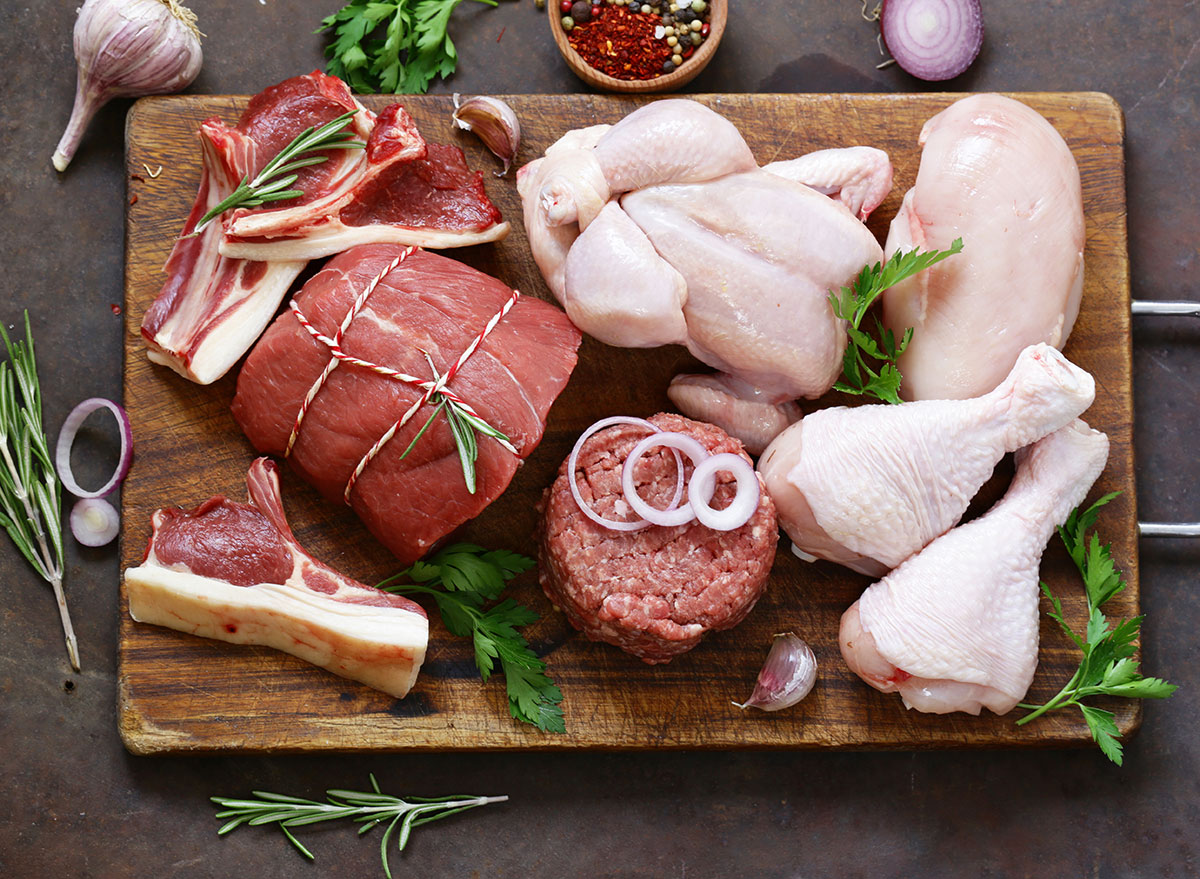
As Shaw points out, what you don't eat makes just as much of an impact on your health as what you do eat. We all know that organic meat is better for you than its processed counterpart—and Shaw argues it's one of the most important areas to make a discerning diet choice. "I'd like to see people eating cleaner meats, if they choose to eat meat at all," he says. "Processed meats aren't just non-organic, they use antibiotics that alter gut flora, as well as growth hormones that are dangerous for consumption." Suppliers also fill meats with phosphate preservatives to keep them on the shelves longer, which has been shown to contribute to several age-related ailments, including kidney disease, osteoporosis, and heart disease.
And here are 21 Things That Happen to Your Body When You Stop Eating Processed Food for more inspiration.
Sauerkraut

Did you know that just a few bites of sauerkraut daily could completely change your gut health as you get older? Turns out, it's just teeming with lactobacillus, a healthy bacteria typically found in your digestive, genital, and urinary tracts. OK, so maybe that doesn't really make you want to add it to your menu, but according to Dr. Sherry, this powerhouse probiotic is well worth it, with impressive effects on your digestion. Those "good" bacteria help to balance out the bad, and a balanced gut is better able to filter out toxins and waste. Sauerkraut not your thing? Dr. Sherry recommends trying kimchi, pickled cucumber, or kefir as probiotic alternatives—especially if you're experiencing common over-40 ailments, like irritable bowel syndrome or colitis.
Greek Yogurt
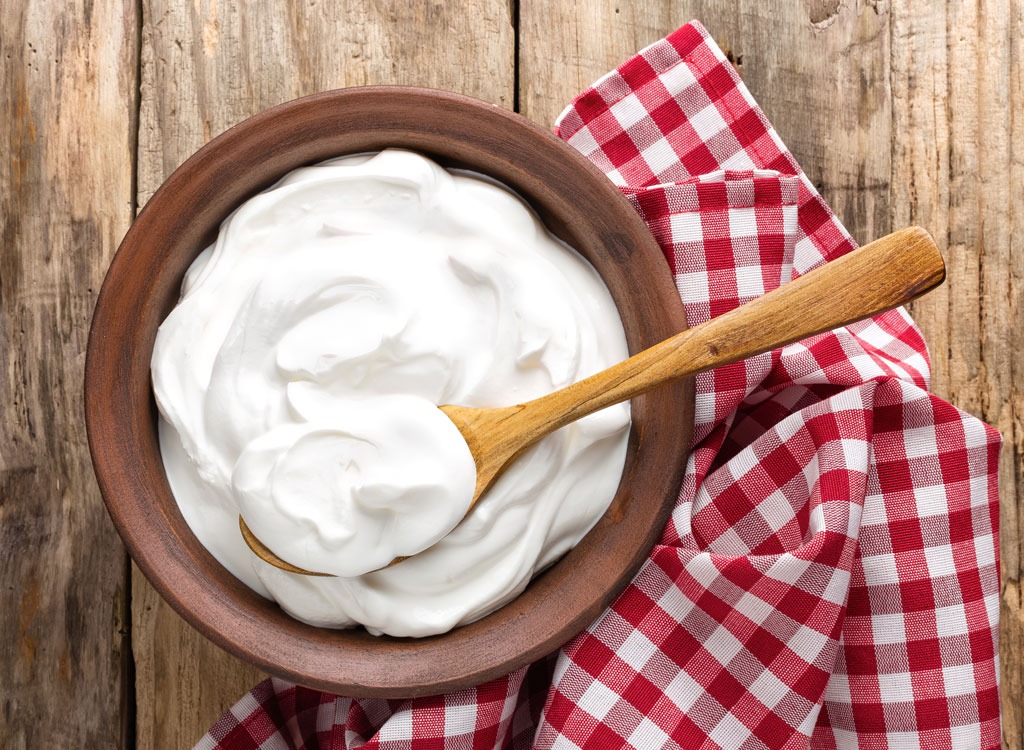
Osteoporosis is a condition characterized by a loss of bone density over time, and it leaves those who suffer from it vulnerable to bone deterioration and fractures. But what many women don't realize is that they're affected by osteoporosis at four times the rate of men, who tend to have higher bone density to start with, and whose bone density peaks at a later age. That's why after your 30s when you're past your own peak density, it becomes vitally important for women to get enough calcium. Shaw recommends Greek yogurt as a great source of calcium, noting that it's also high in protein.
Dark Chocolate
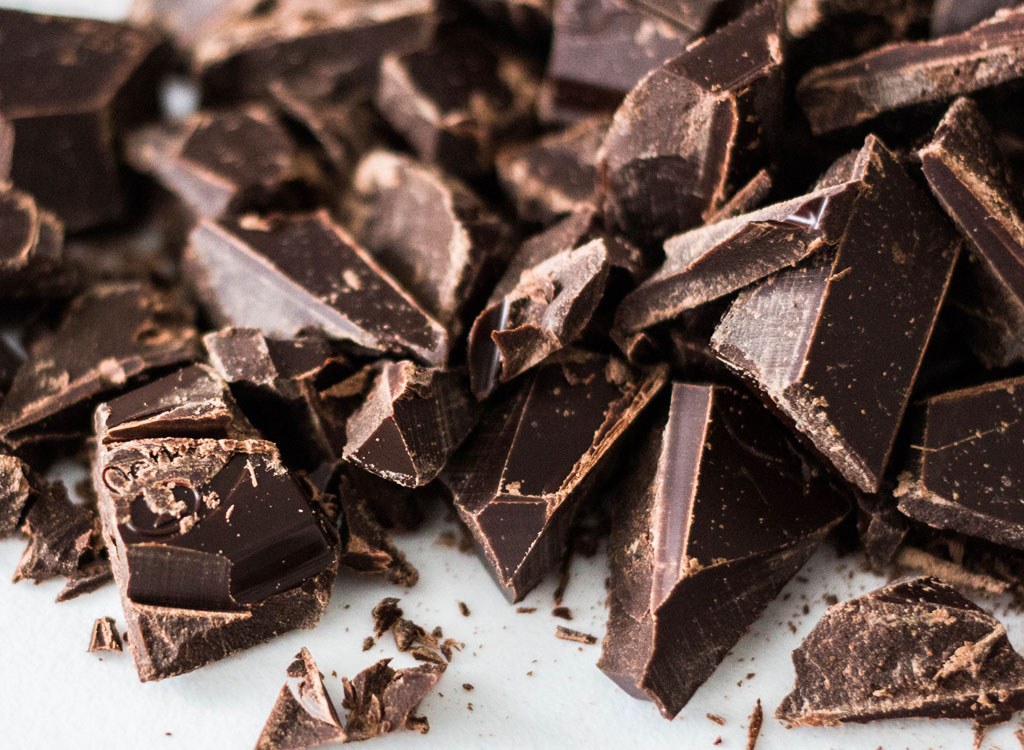
The green stuff is important, but good health is more than just kale salads and broccoli. Dark chocolate may feel like a splurge or cheat food, but it's actually got a whole range of benefits for our bodies—in particular, our aging skin. According to Greuner, "dark chocolate contains high levels of a compound called flavanol to help skin look youthful. This compound helps skin not only to look smoother and more hydrated, but also to protect skin against sun damage." But before you hit the sweets aisle, make sure you're making the right selection. "It's important to choose dark chocolate with at least 70 percent cocoa in order to ensure flavanol levels are high enough to experience its benefits," he explains. Just make sure you're not eating of these 7 Worst Dark Chocolates for Weight Loss!
Peas
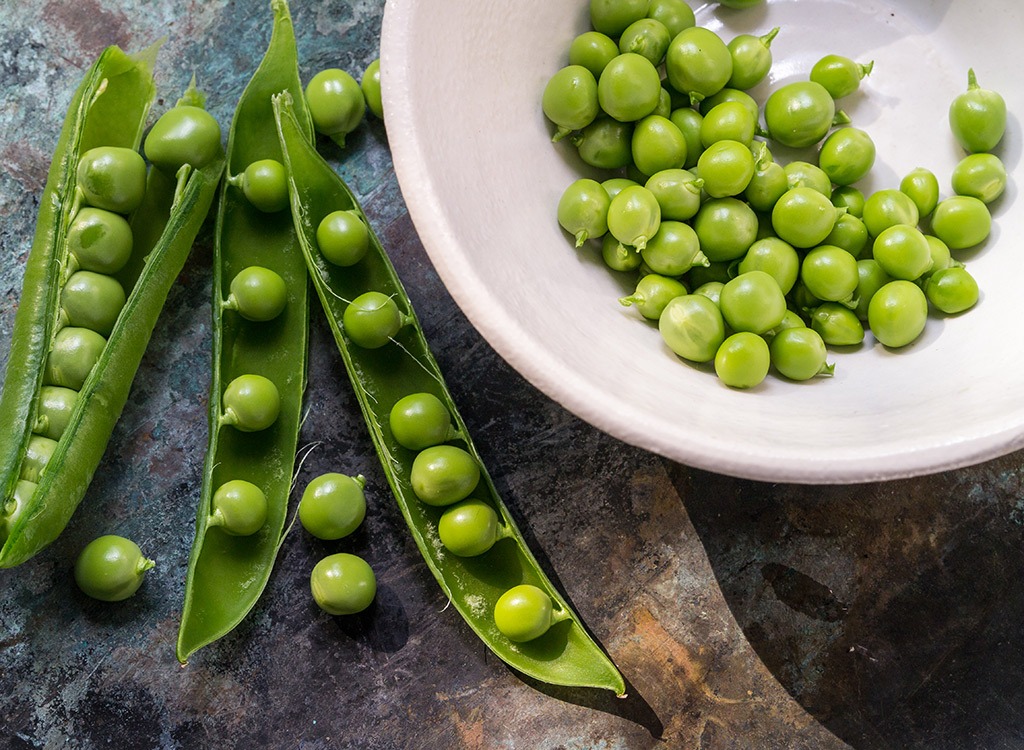
Your mom always told you to eat your peas—and per usual, your mom was right. Dr. Sherry tells us that eating green peas, as well as split peas or split pea soup, is a great way of staying regular past 40, due to their surprisingly high fiber content: 7 grams per cup! "It's not only about feeling comfortable every day (though that's important, too)," she explains. "Eating high-fiber peas can also reduce your risk of colon cancer." Quite a feat for such a tiny vegetable!
Carrots
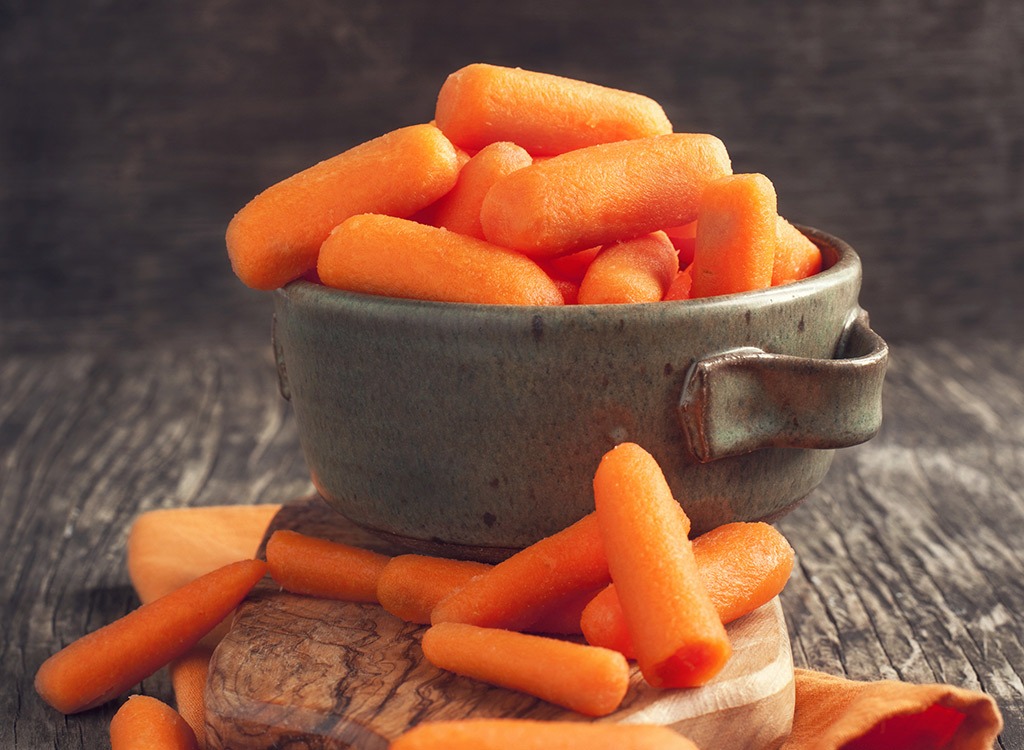
Looking for a great way to keep your skin healthy and beautiful past 40? According to Bailey, carrots are your best bet—and the number one food she recommends to her patients. "Beta carotene is a precursor to vitamin A," she says, "a critical nutrient for skin health that also slows skin aging. The antioxidant properties of beta carotene help defend skin against free radical damage from UV ray exposure, environmental stressors, and free radicals produced in skin due to normal skin functioning. At high doses, beta carotene provides some photoprotection (sun protection) for skin, too, but not enough to skip sunscreen." And if it's a youthful glow you're after, Dr. Bailey assures us you won't be disappointed. "You get an added bonus from beta carotene because it warms your complexion with a healthy glow within days, and we can all use that. This warm beta carotene skin tone has been scientifically proven to be more attractive than a sun tan."
Bok Choy
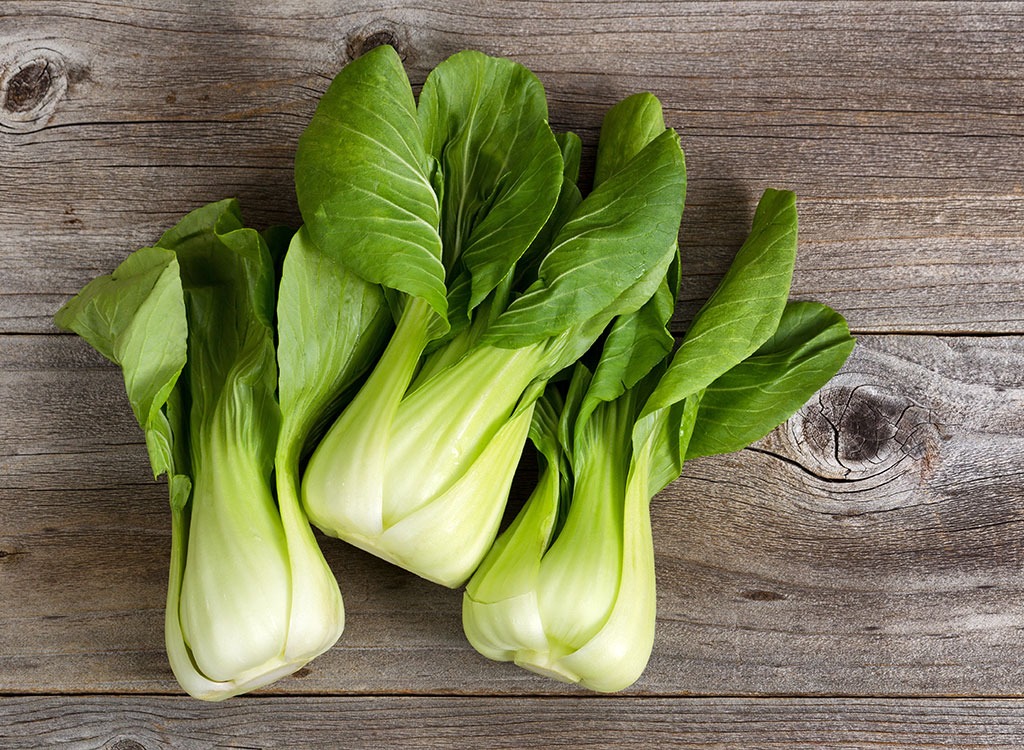
Bok choy is one of the healthiest leafy vegetables you can get your hands on, especially as you age. It's one of the most calcium-rich greens around, along with its cousin, Chinese cabbage—and thankfully, both make delicious additions to a hearty veggie stir fry. Dr. Sherry recommends making them a regular part of your diet, noting that they're well known for supporting good bone health and cardiovascular health.
Wheatgrass
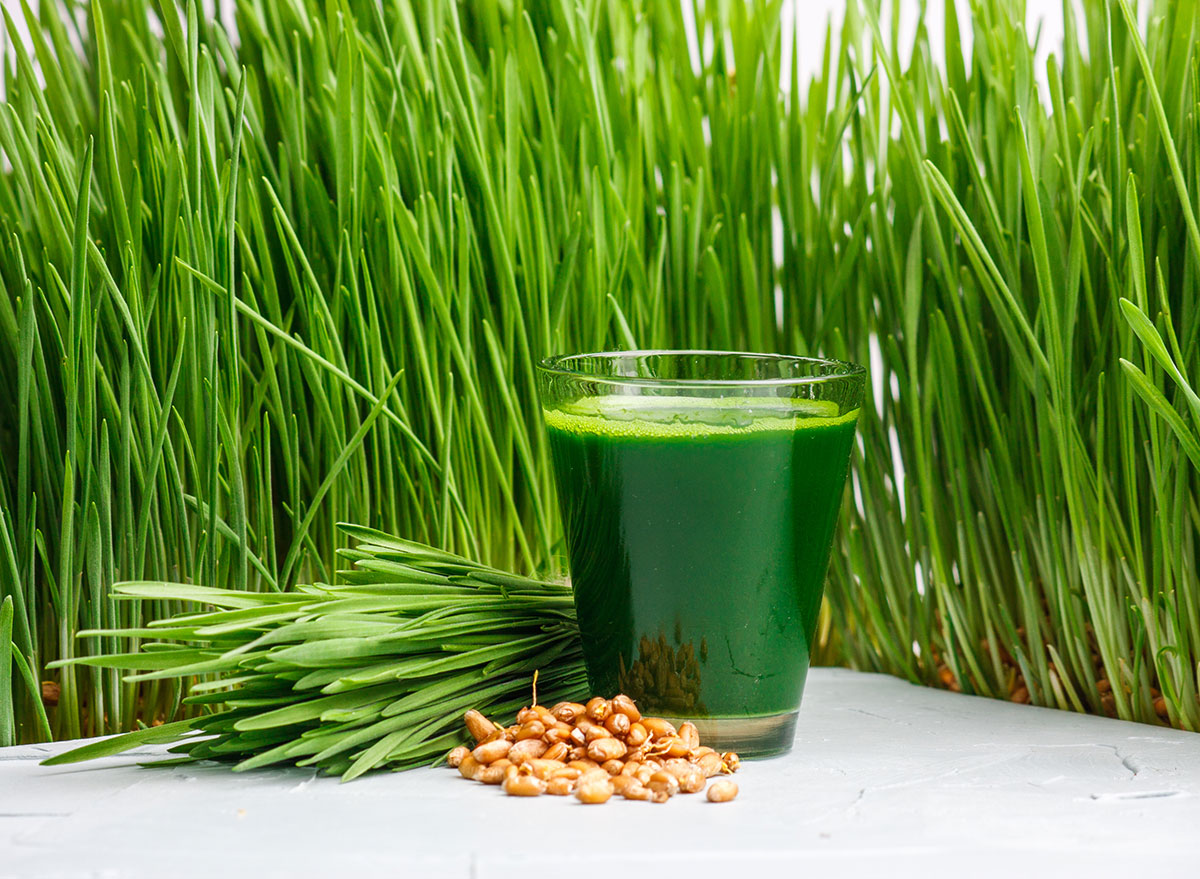
Looking for a healthy way to start your day? According to Greuner, wheatgrass can be a hassle-free way to get a high concentration of nutrients all at once—especially for women over 40. "This go-to health beverage containing vitamins A, C, and E helps to regulate blood sugar properly, which for many women is the answer to headaches, vision problems, and skin infections," he shares. "Furthermore, this easy dietary addition has shown to keep its drinkers feeling young by protecting against arthritis and related inflammation of the joints." Not feeling the flavor? Try adding a shot of wheatgrass to a smoothie with fruits like apples, pears, or pineapples for a more palatable twist.
Heirloom Tomatoes
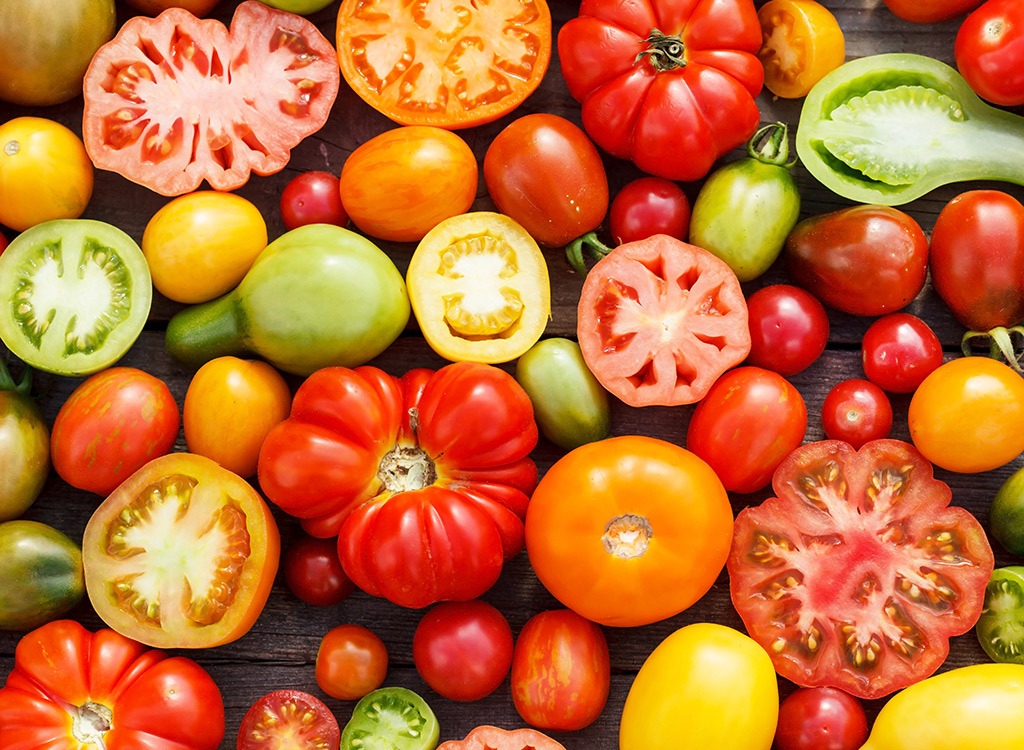
If you think of tomatoes as the mushy, mealy, sliced sandwich topper served at your local deli, you're missing out on the beauty (and benefit!) of eating truly great tomatoes. Not only are heirloom tomatoes so rich in flavor that you might be inspired to eat them on their own with just a pinch of salt—they also come with a range of health perks for women over 40. Dr. Sherry points out that tomatoes have superior anti-inflammatory properties due to their high content of the antioxidant lycopene. They can also provide you with vitamin C, fiber, potassium, beta carotene, and biotin—all of which translates into better heart health, resistance to age-related skin damage, and a reduced risk of cancer.
Walnuts
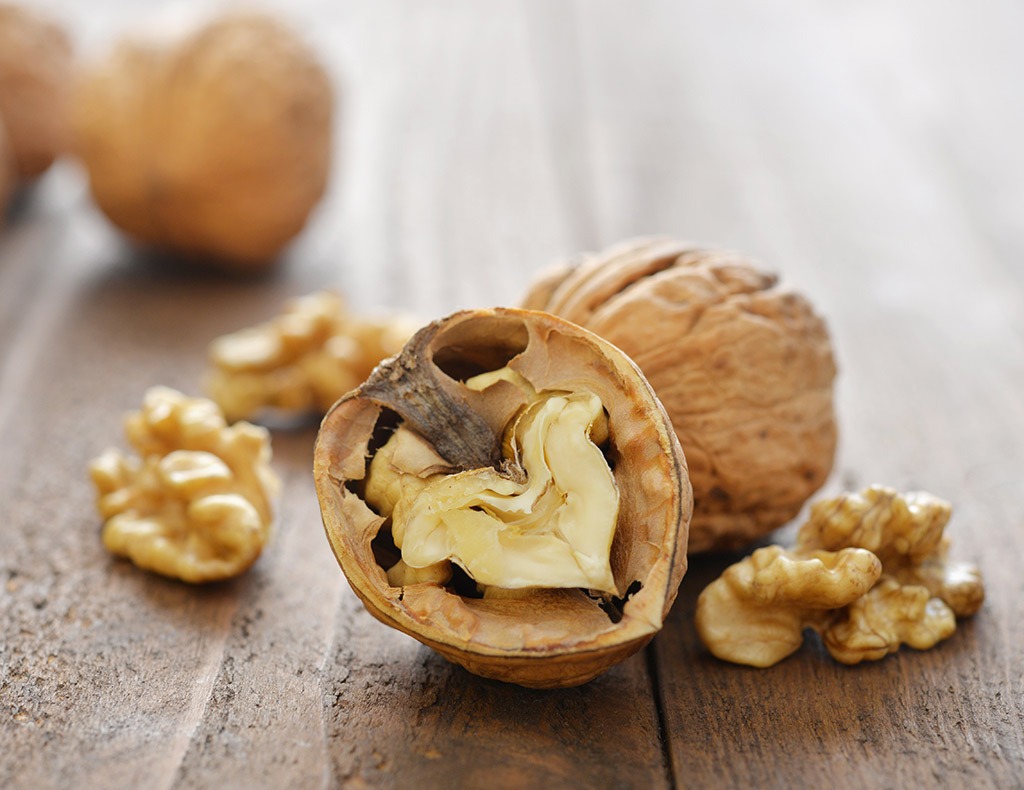
Need a new, go-to snack for a quick energy boost? Walnuts offer a high-protein option that you can easily take with you on the go. Dr. Sherry says that the polyphenols found in walnuts fight inflammation, a condition at the root of many age-related illnesses affecting women, including heart disease, Alzheimer's, type 2 diabetes, and cancer.
Papayas

Papayas have a little-known secret weapon when it comes to women's health. According to Greuner, who recommends them highly, "Papaya fruits are especially beneficial for women in their 40s and older. Their vitamins help to stimulate estrogen production, regulating the menstrual cycle, and reducing the pain of cramps in women." This comes in particularly handy in our 40s, as cycles can become erratic in anticipation of menopause. "Similar to many other fruits," he continues, "papayas also help skin to look young and reduce pain of arthritis by maintaining joint health." Enough said, right? Pass the papaya—and these 39 other foods women over 40 need to be eating.
And now that you know what to stock up on, here's everything you should avoid in 40 Foods Women Over 40 Should Avoid Like the Plague.

